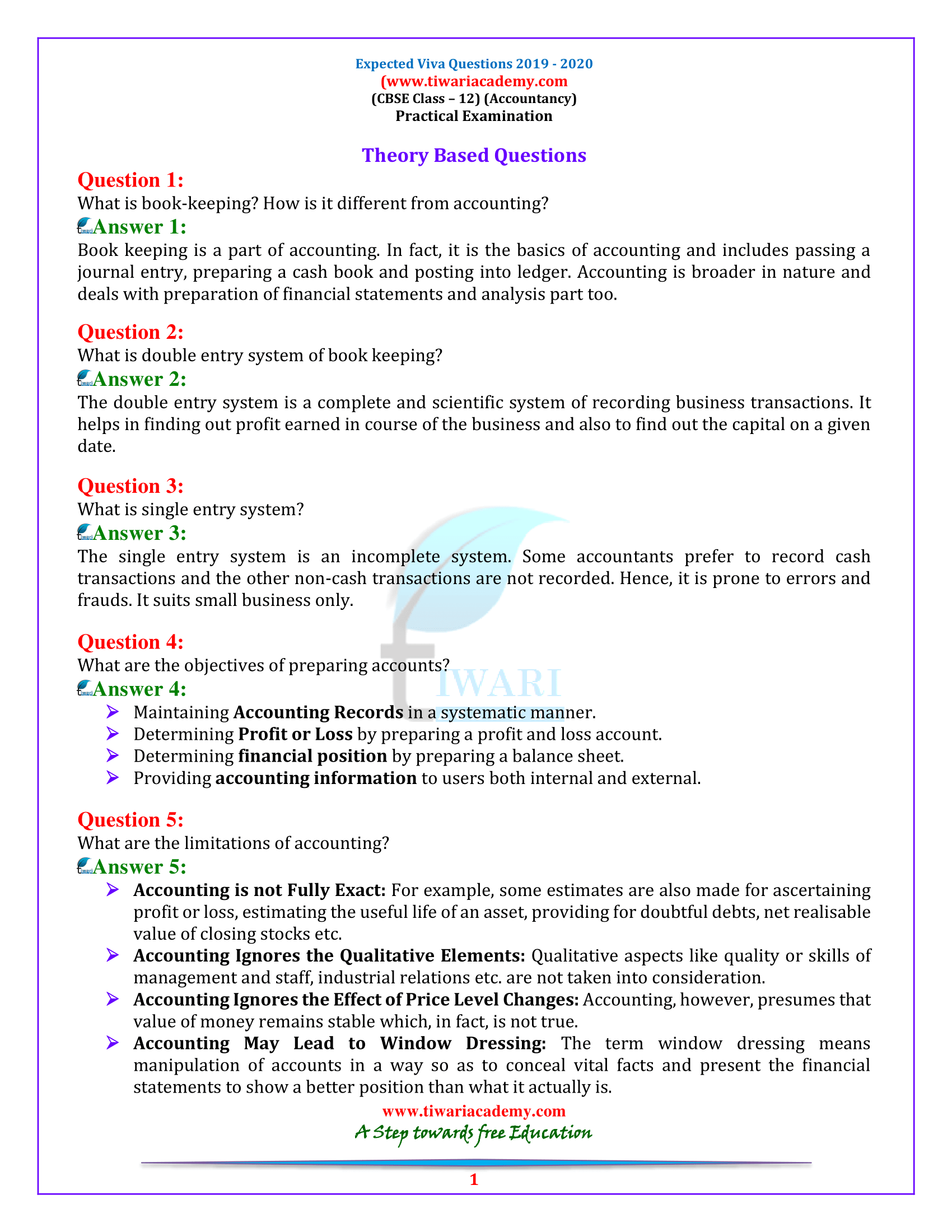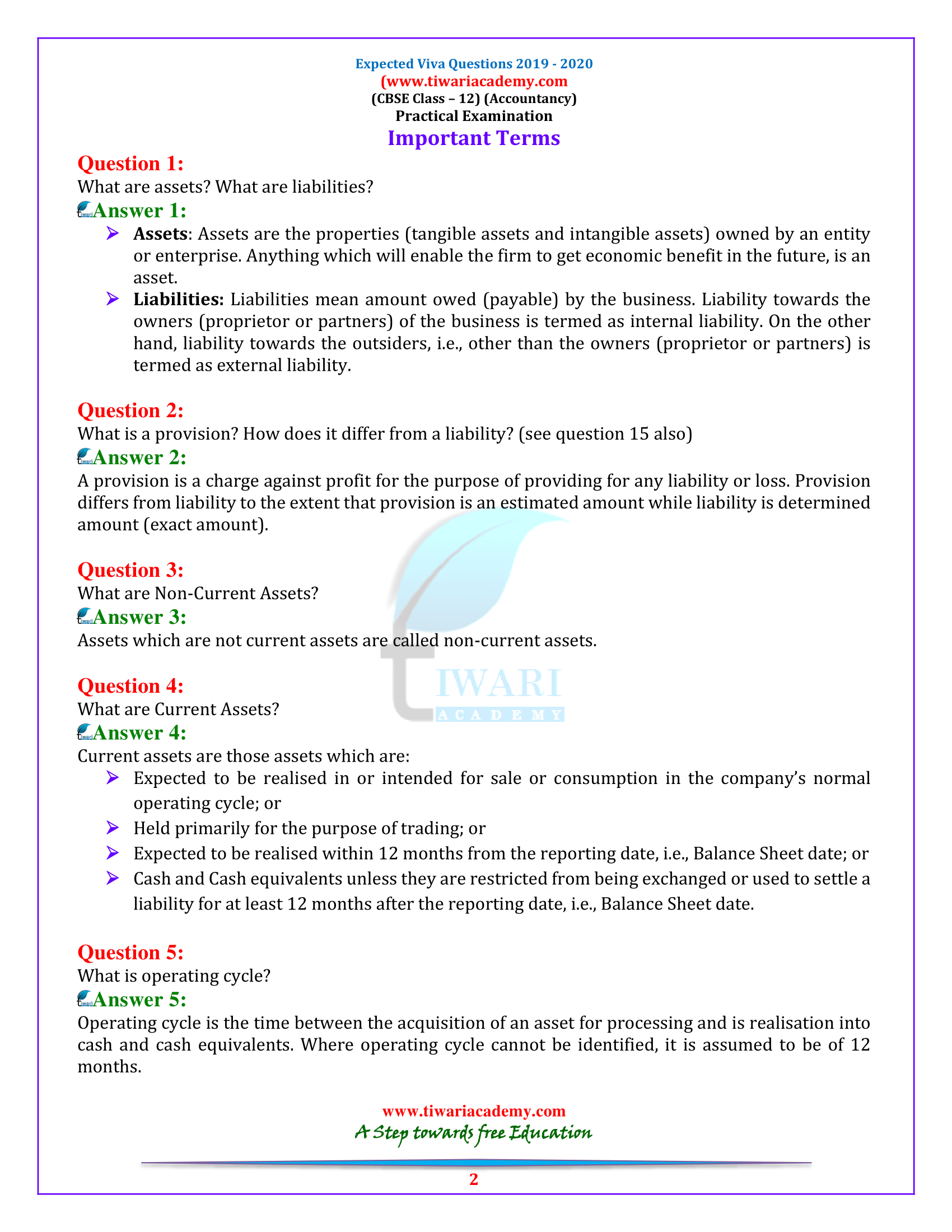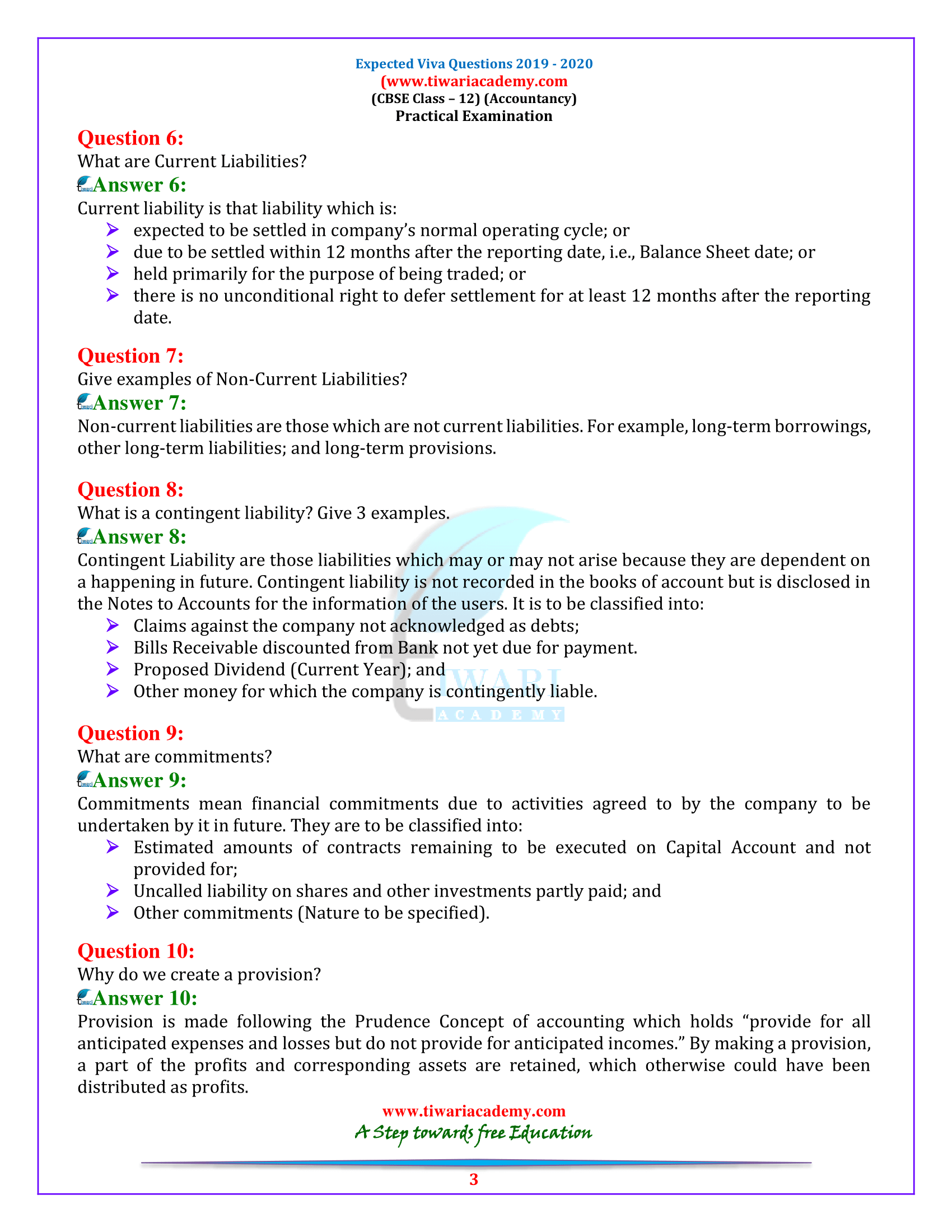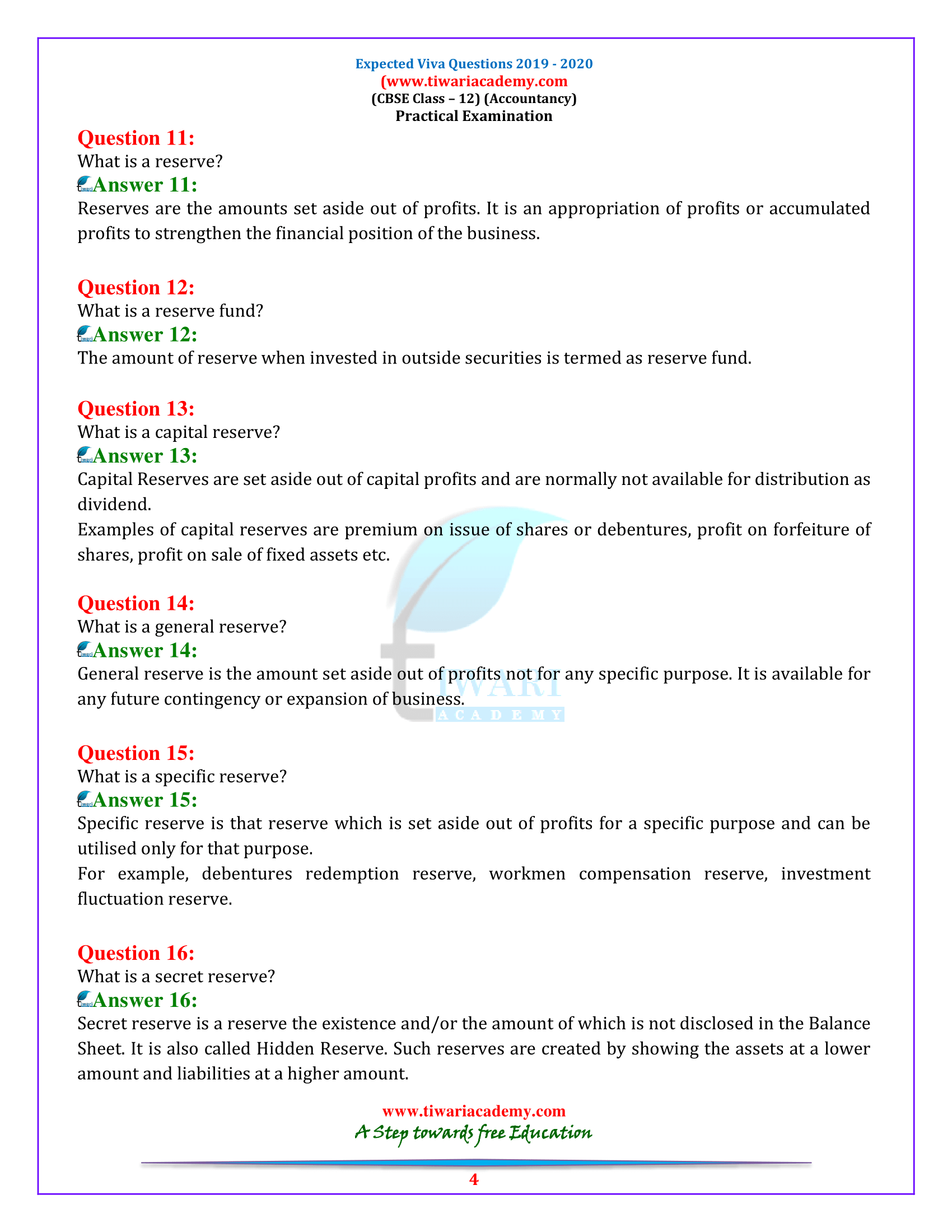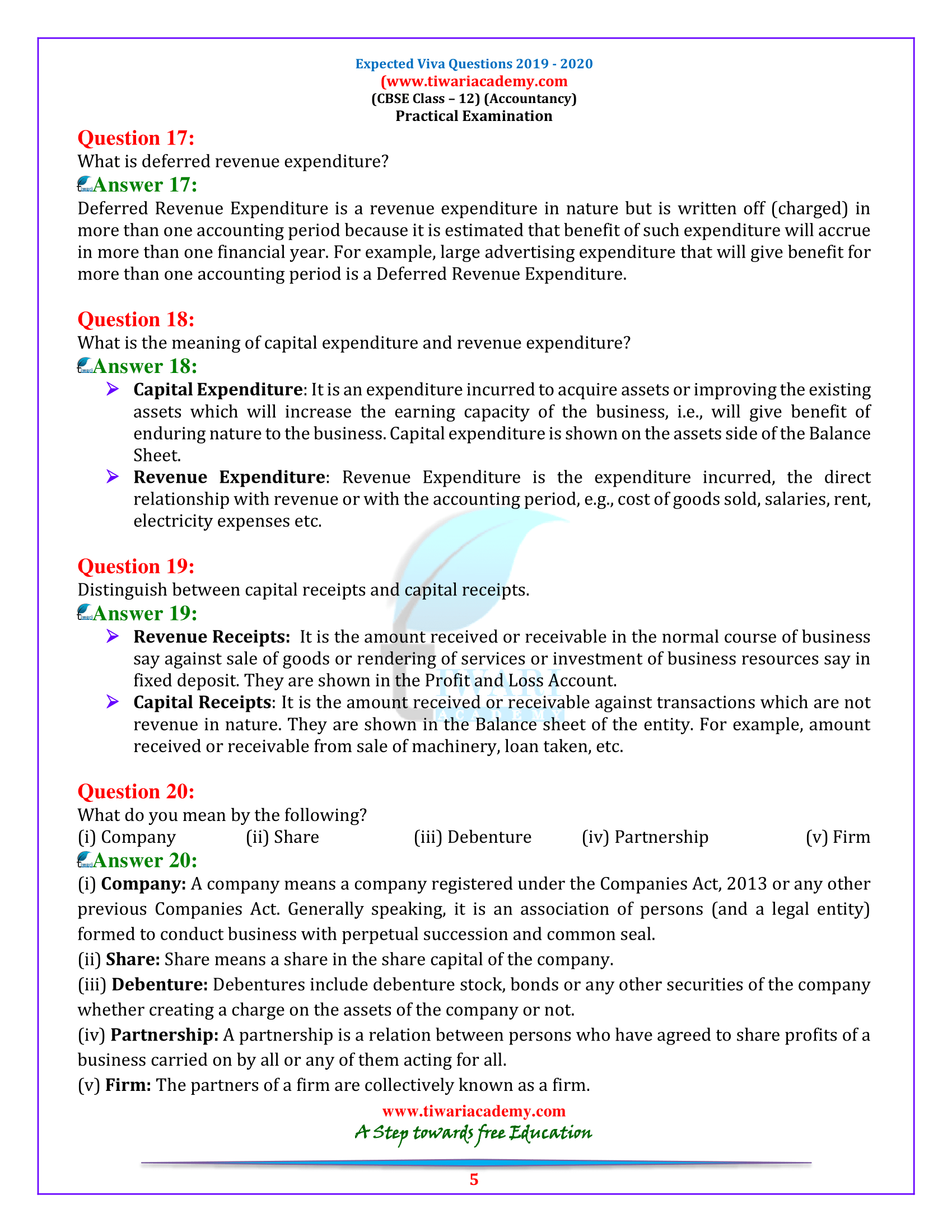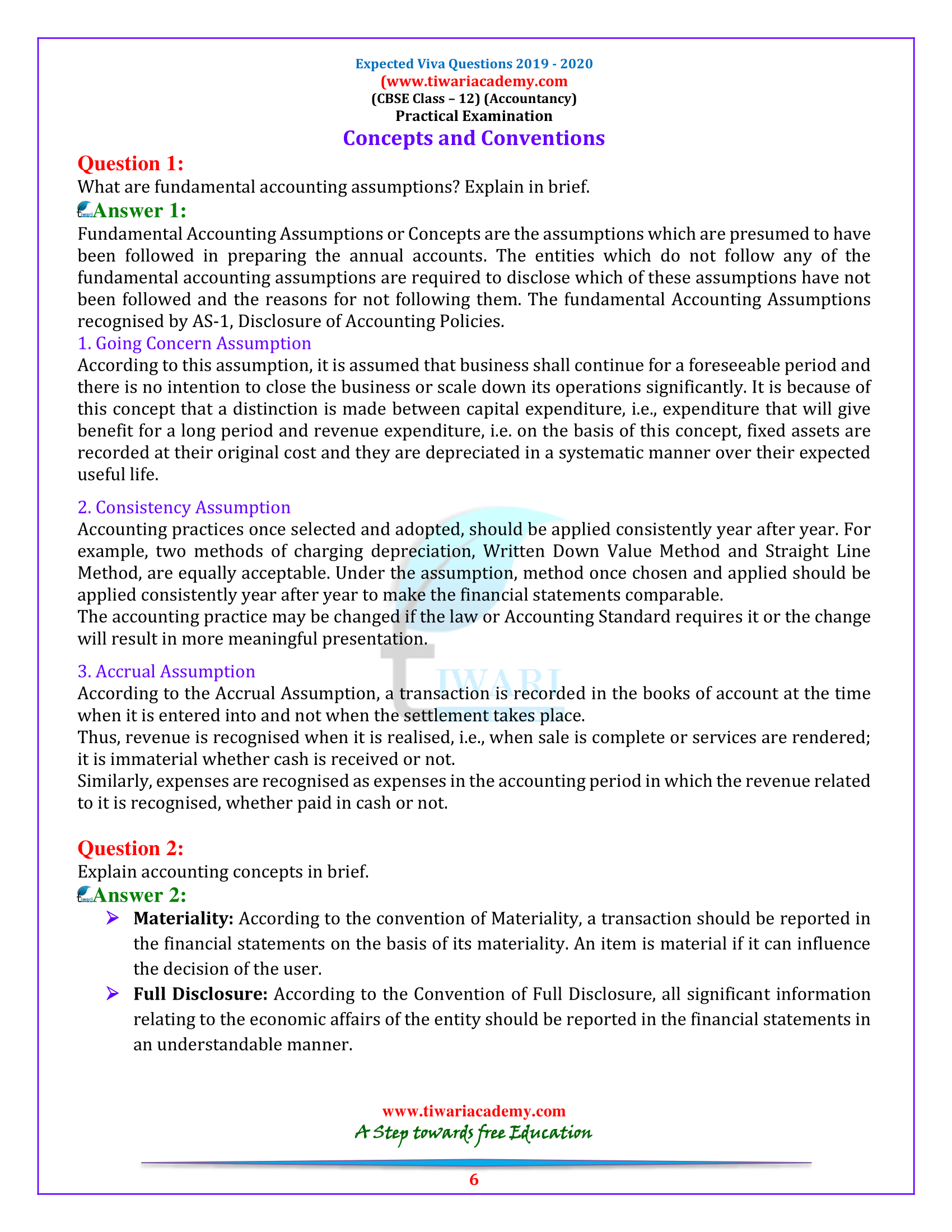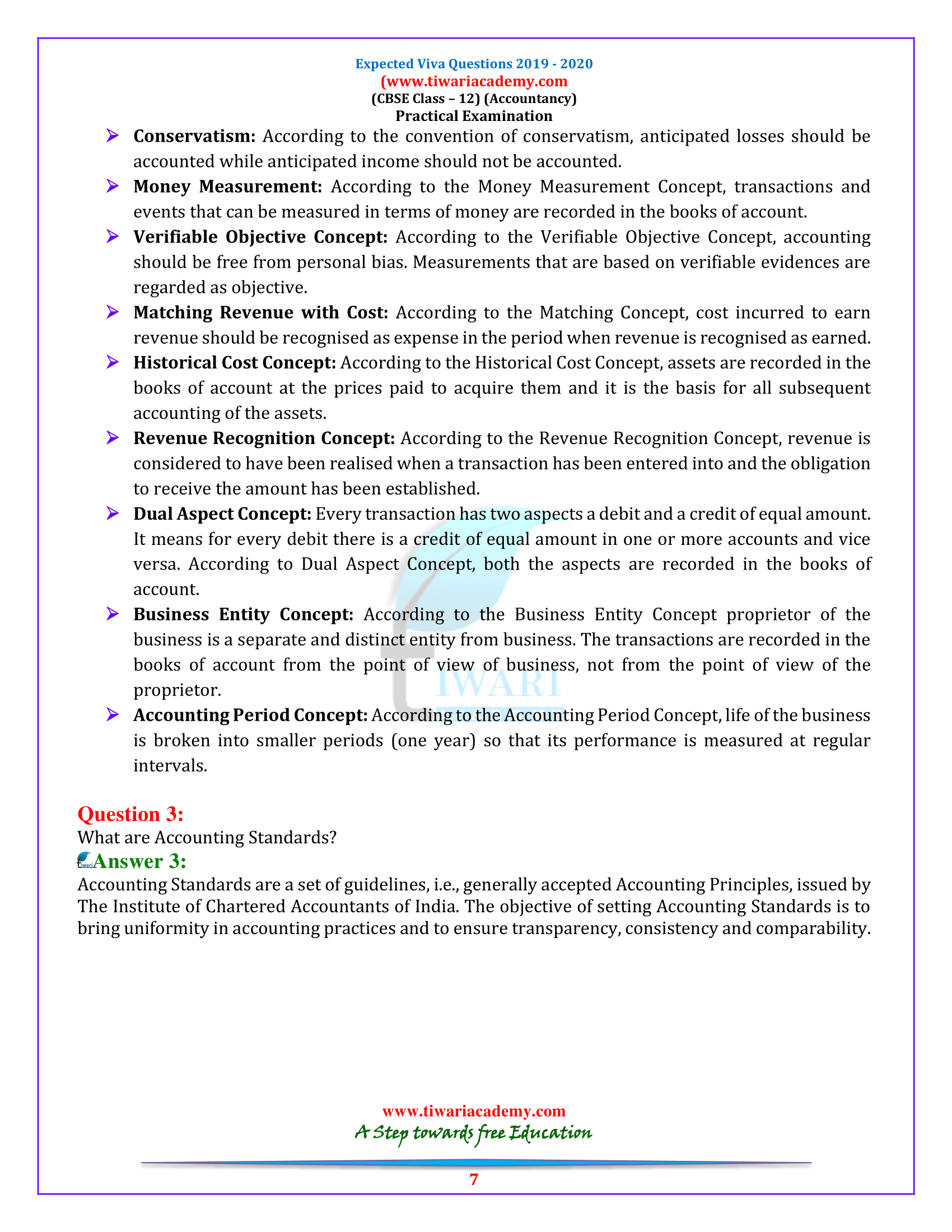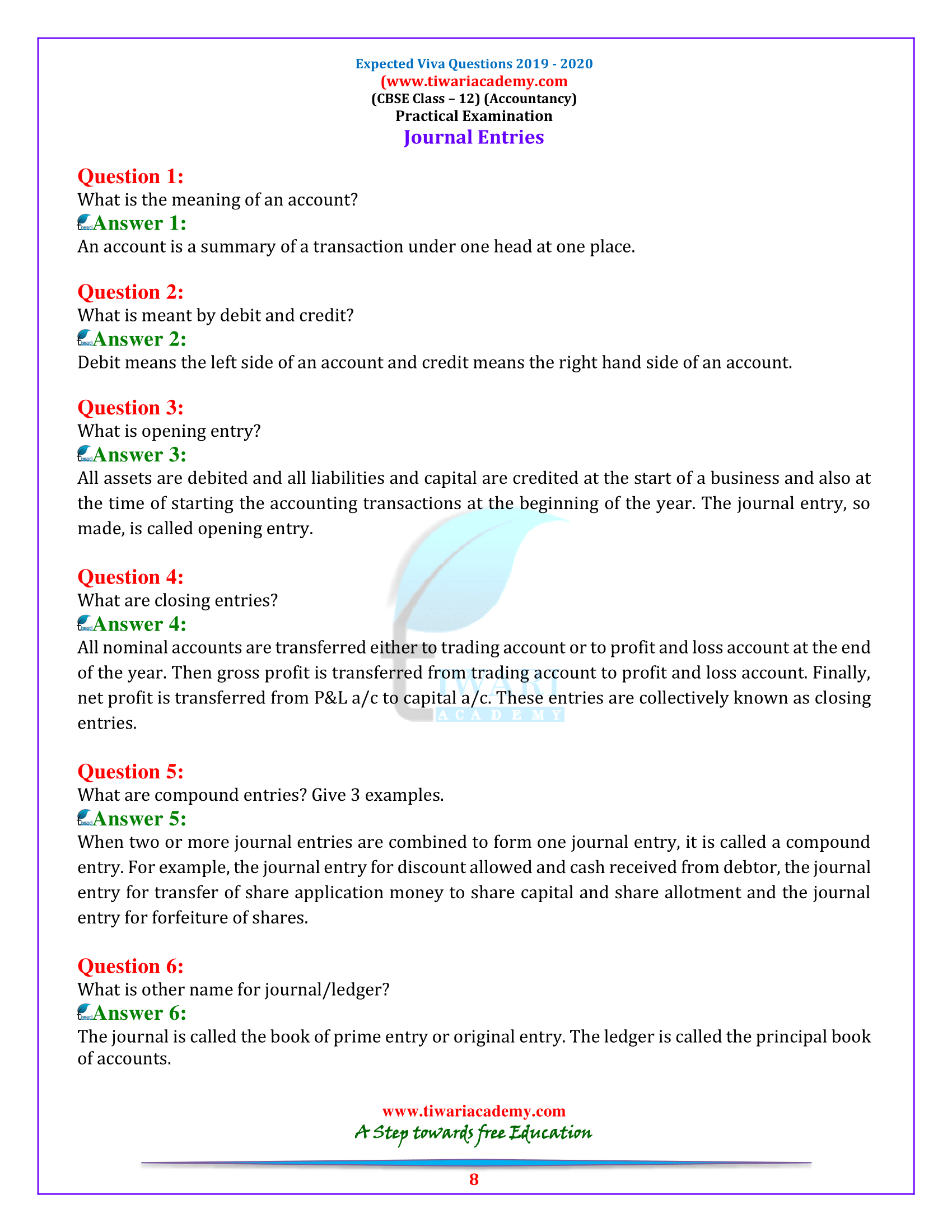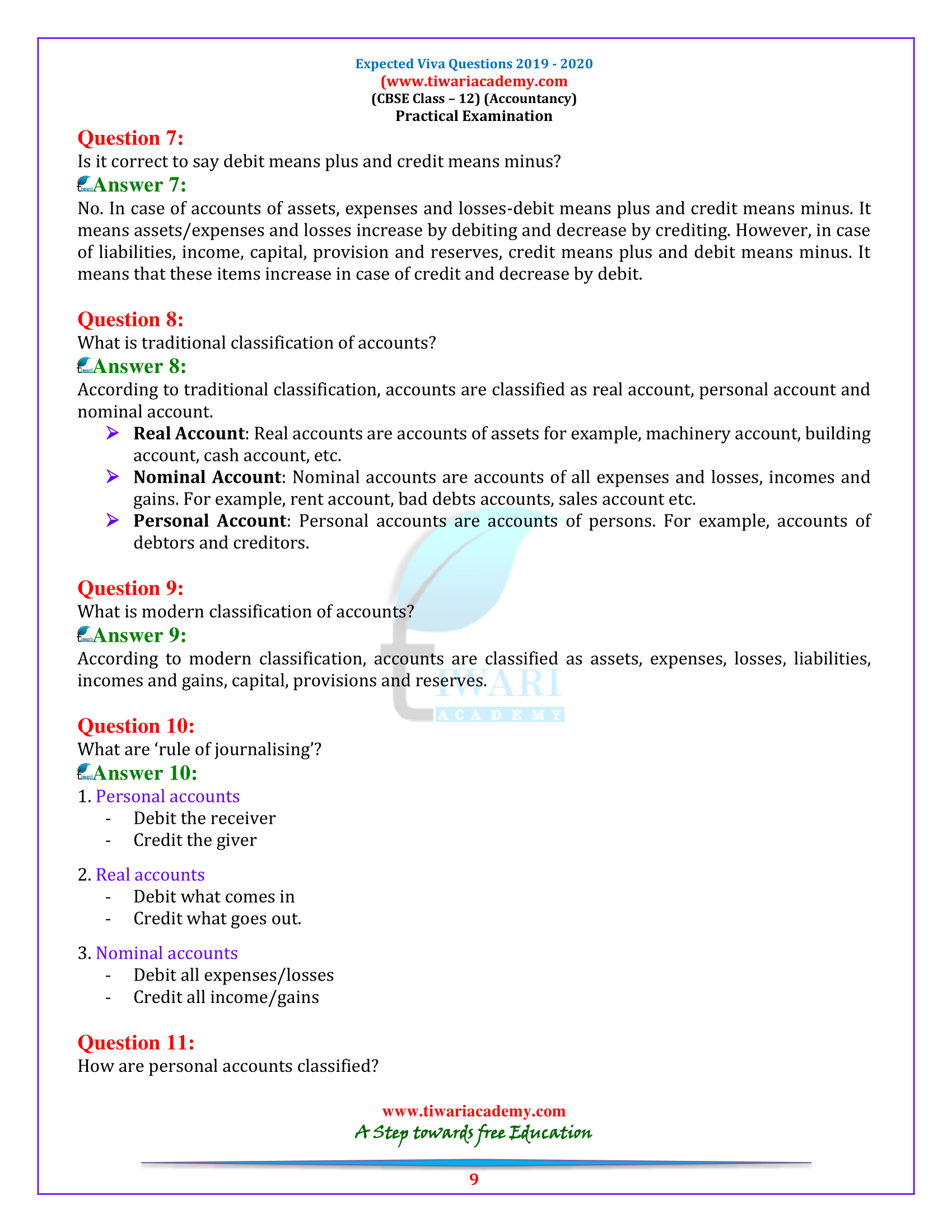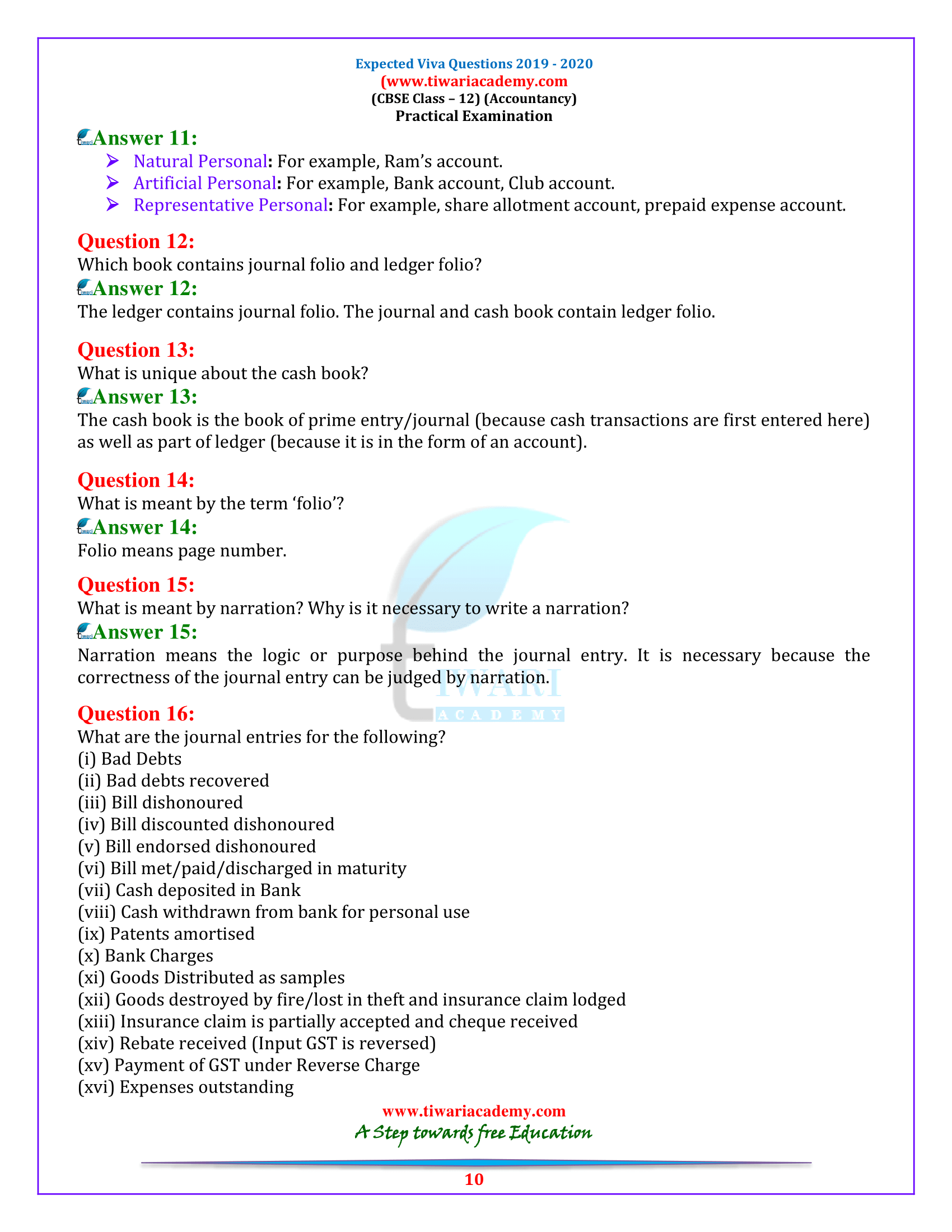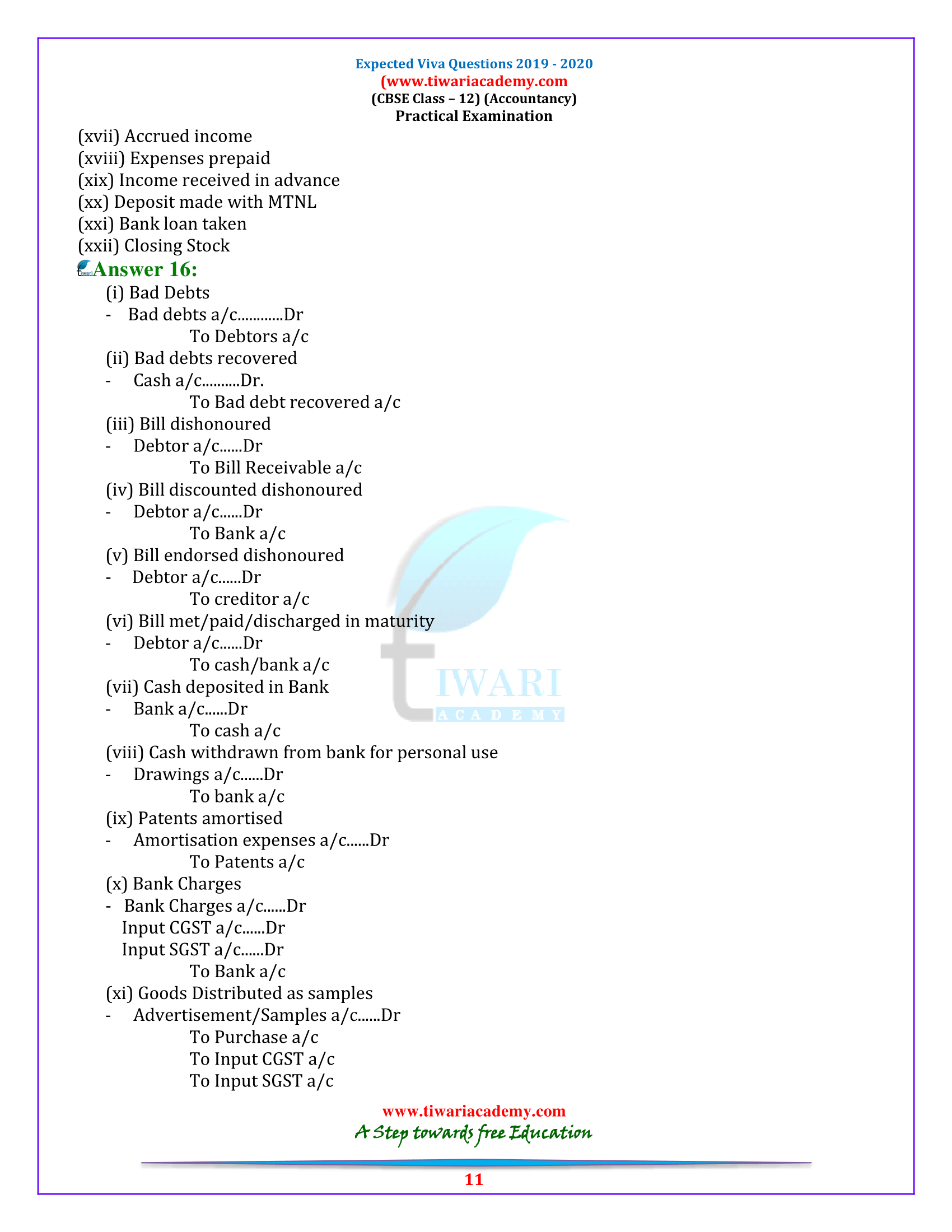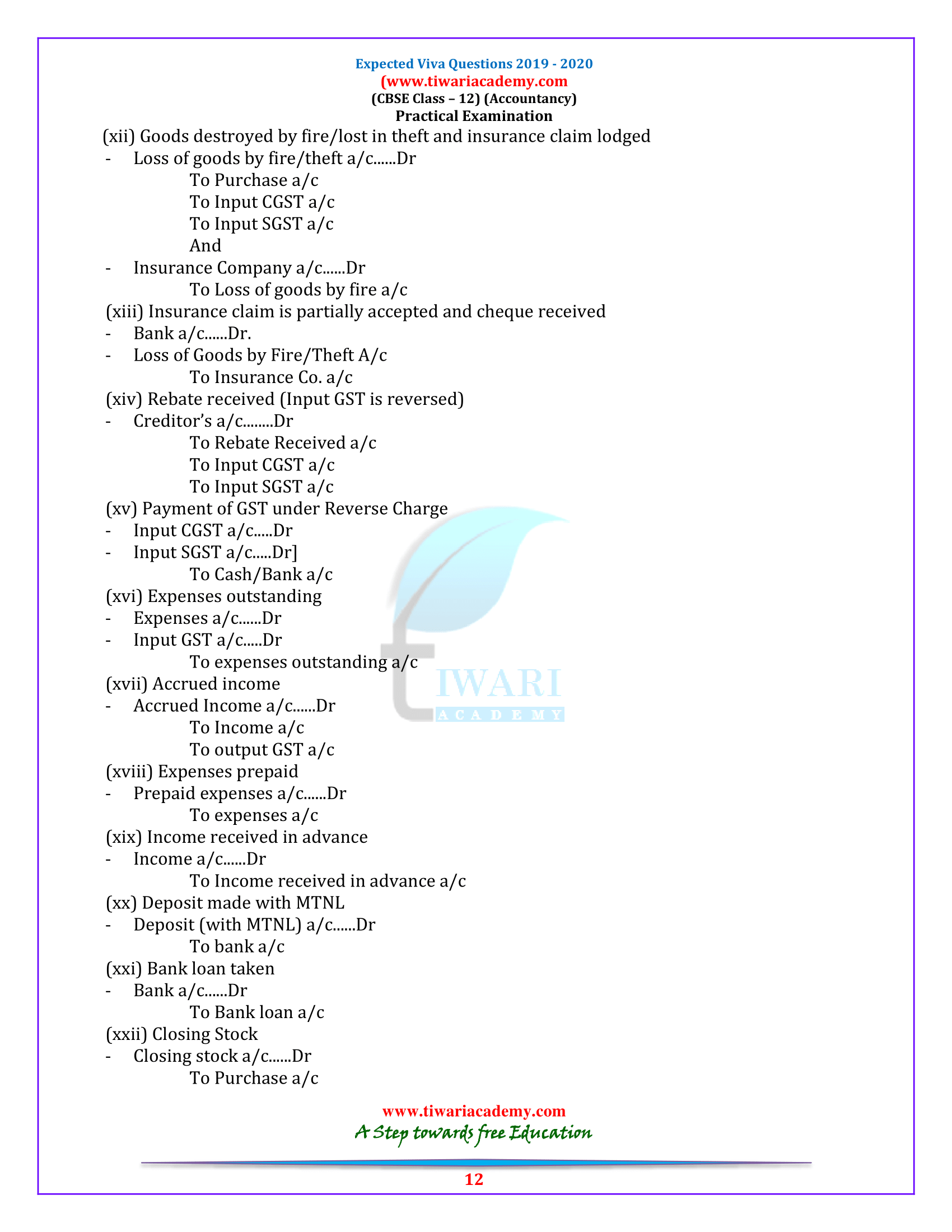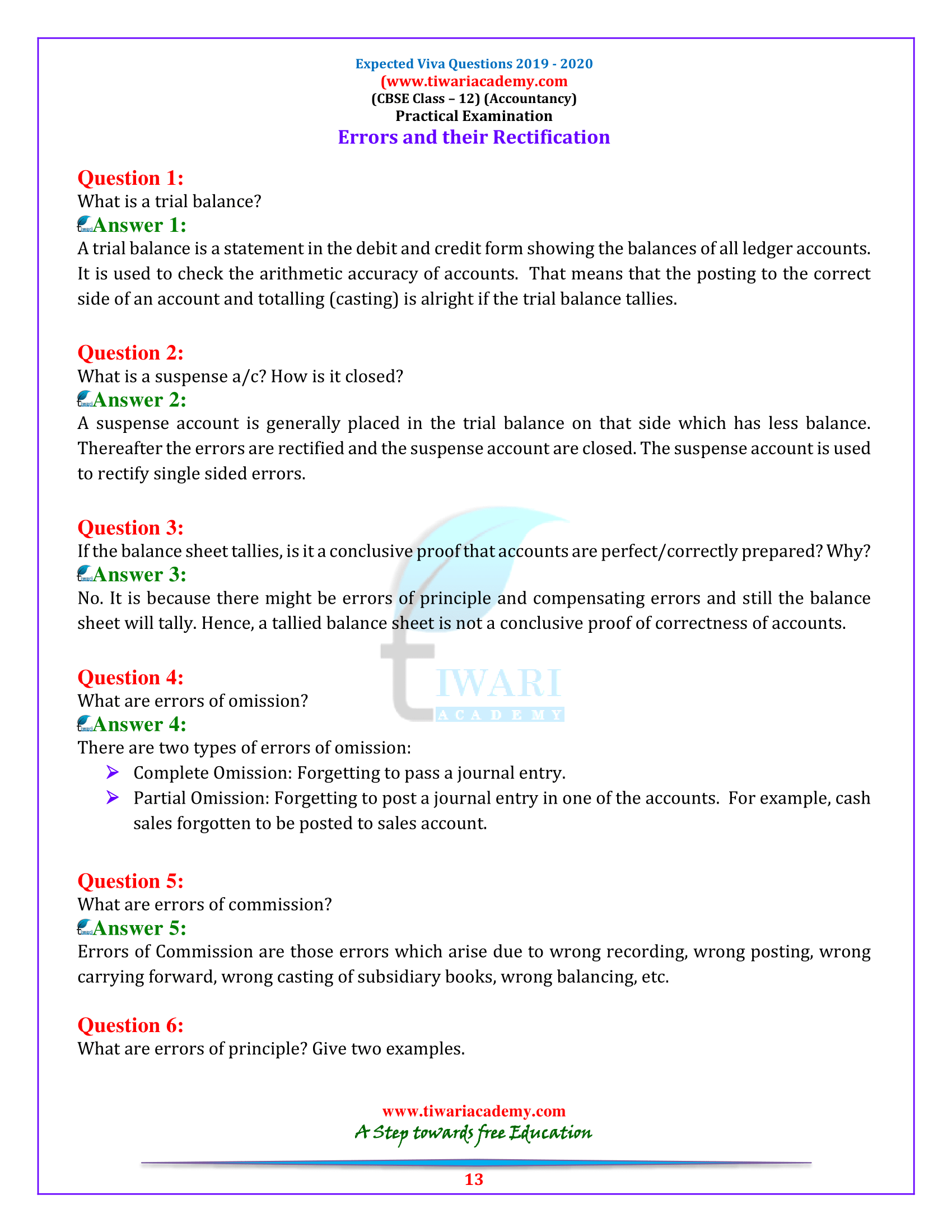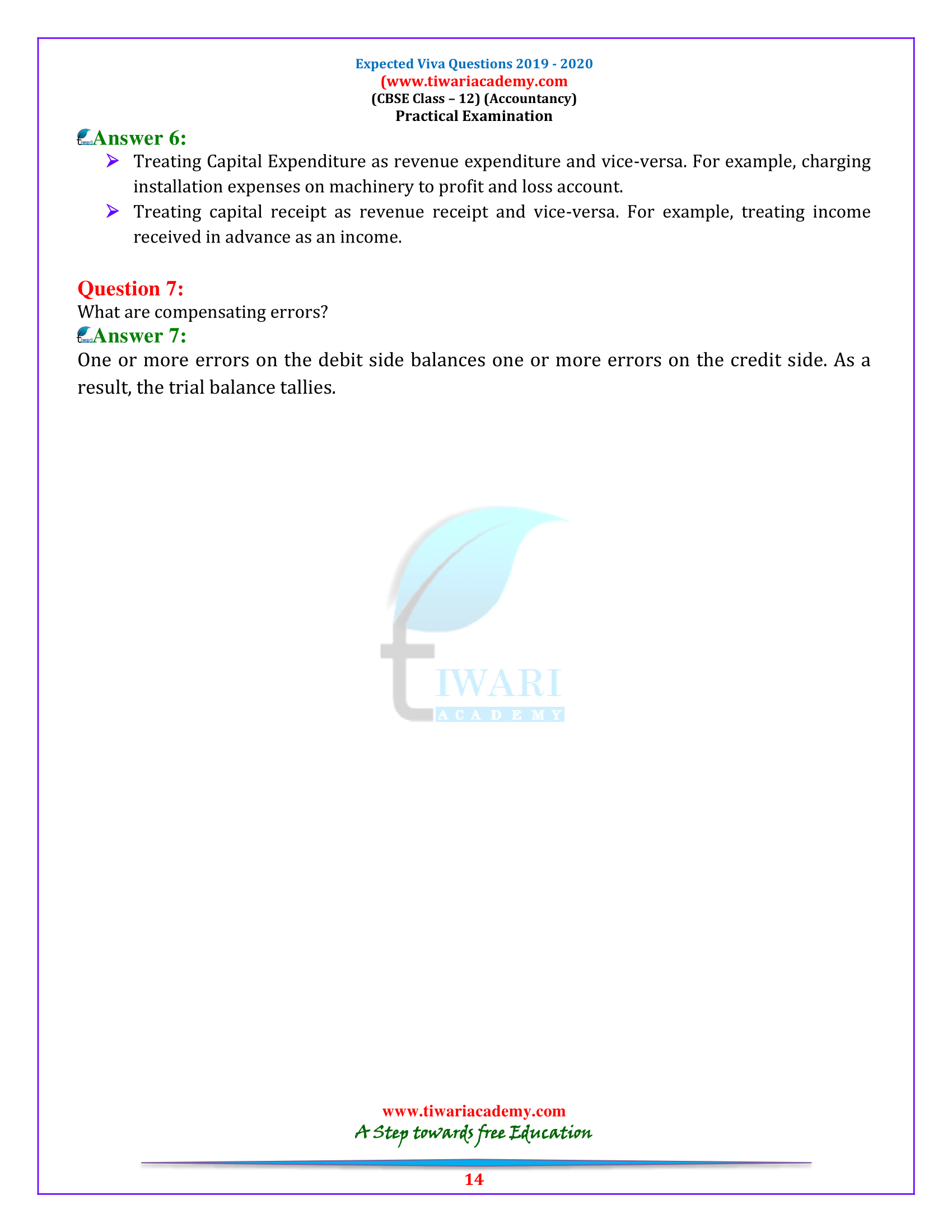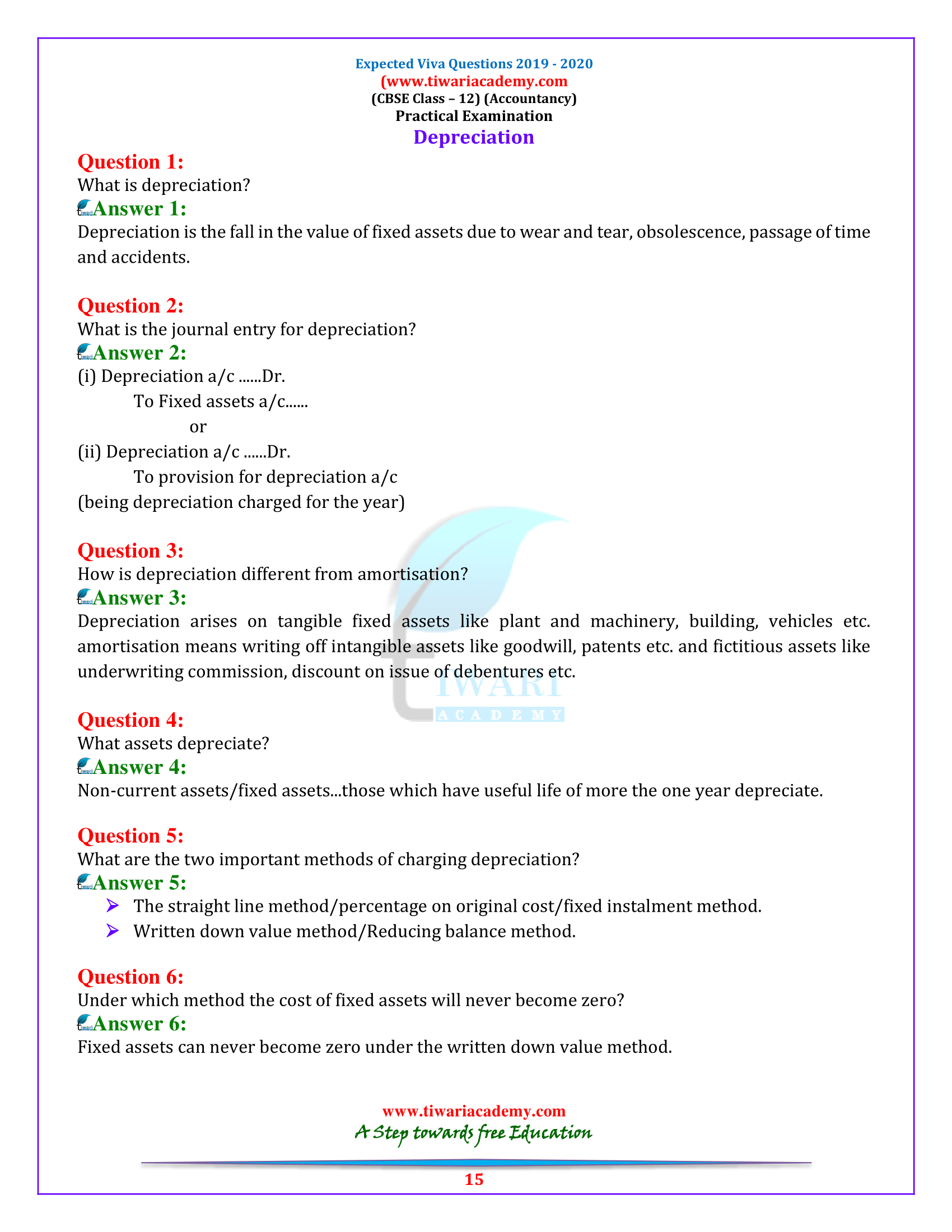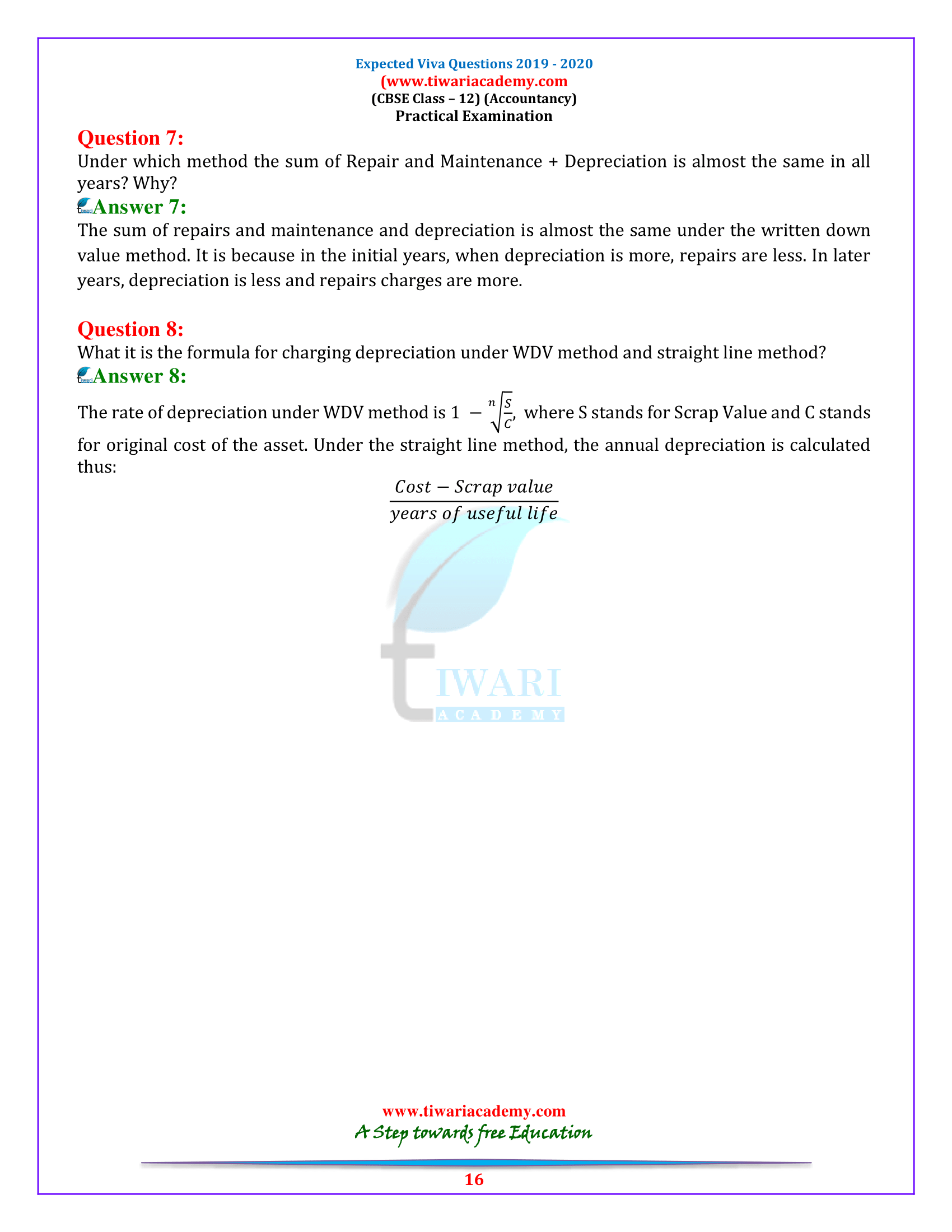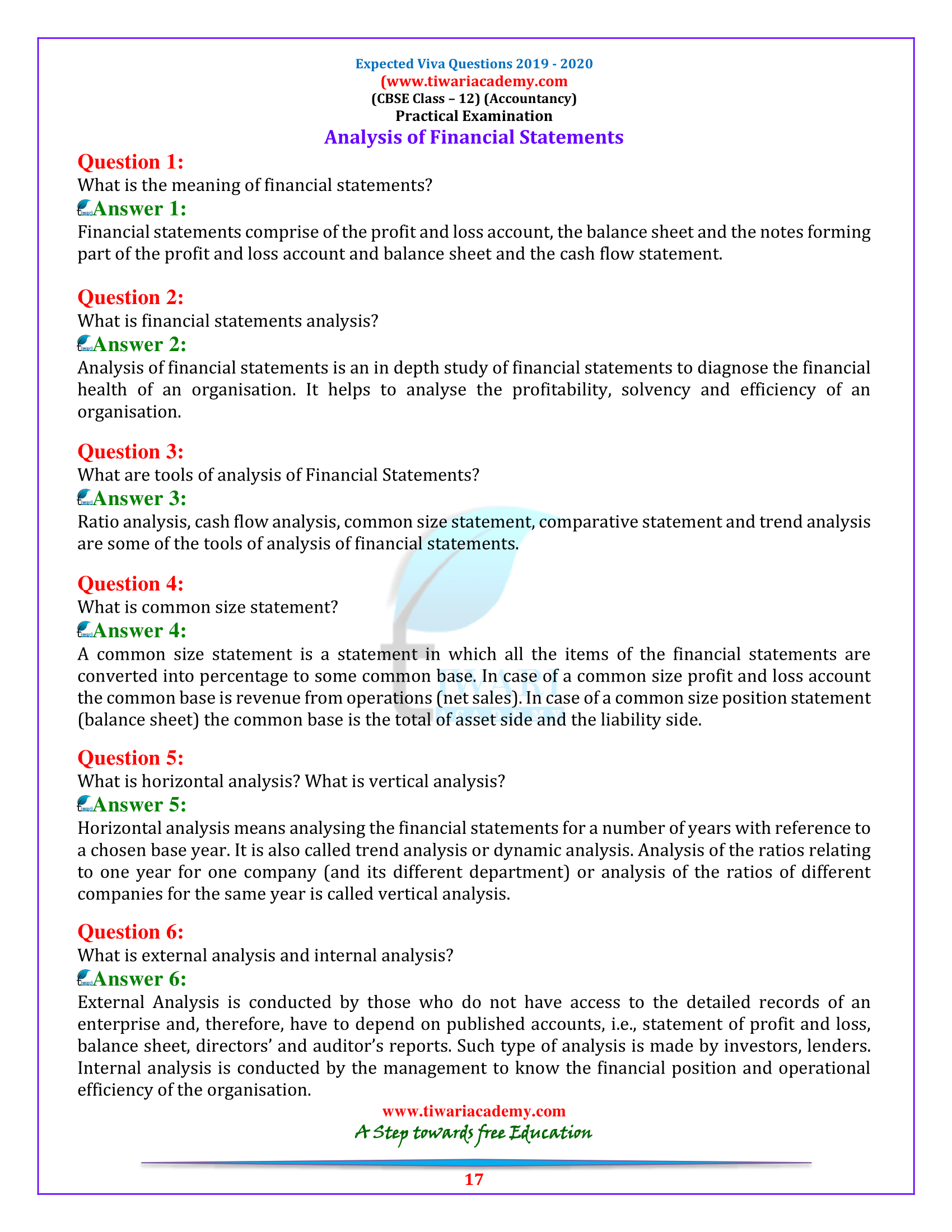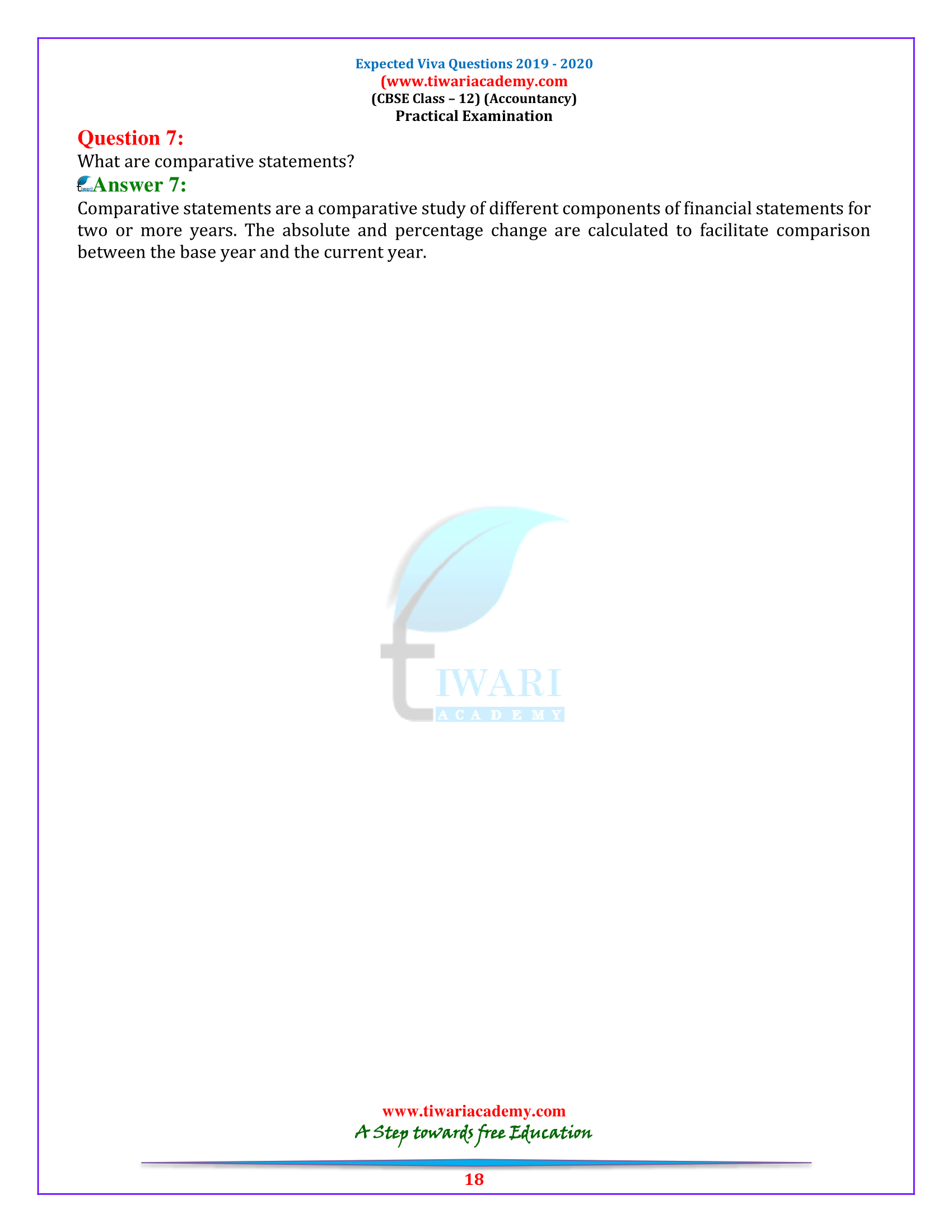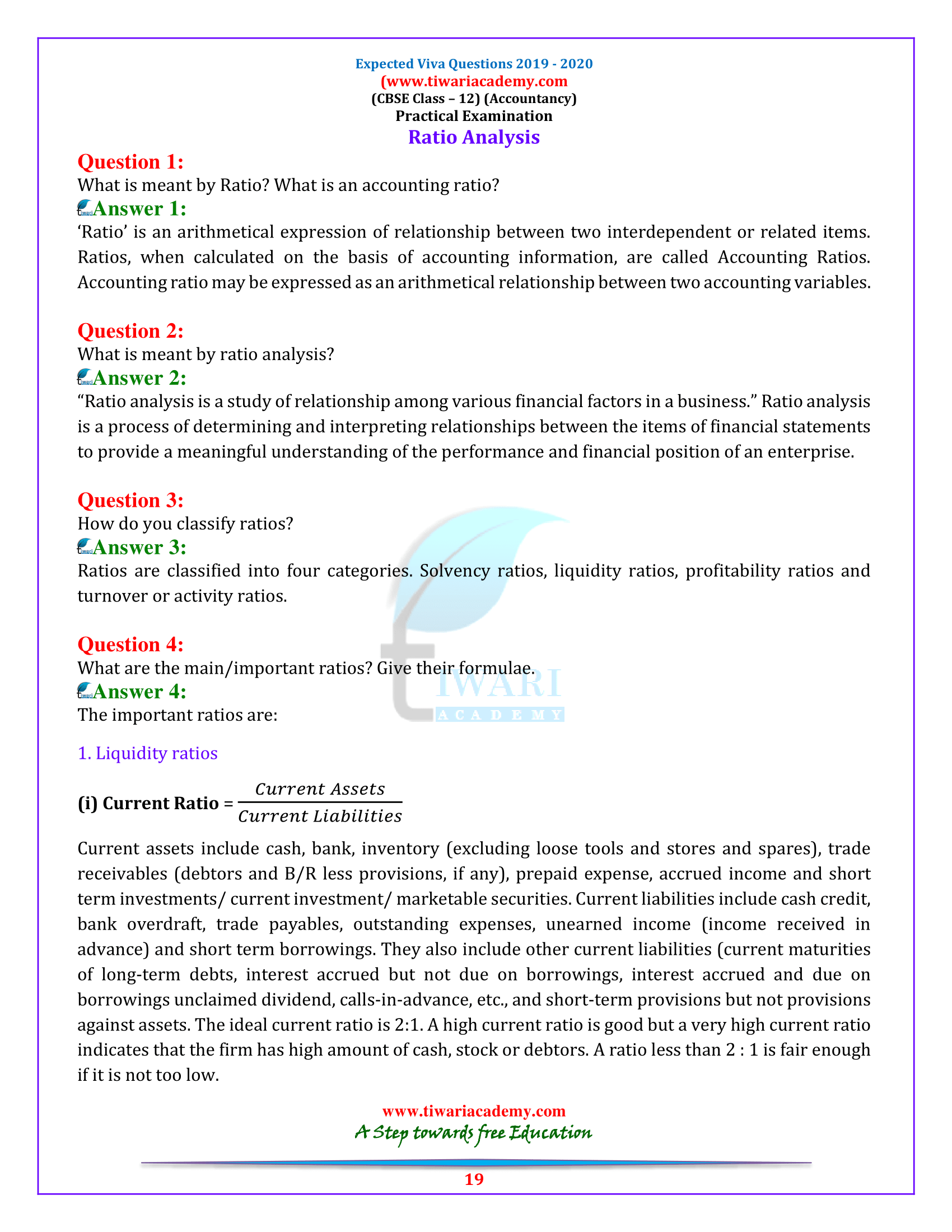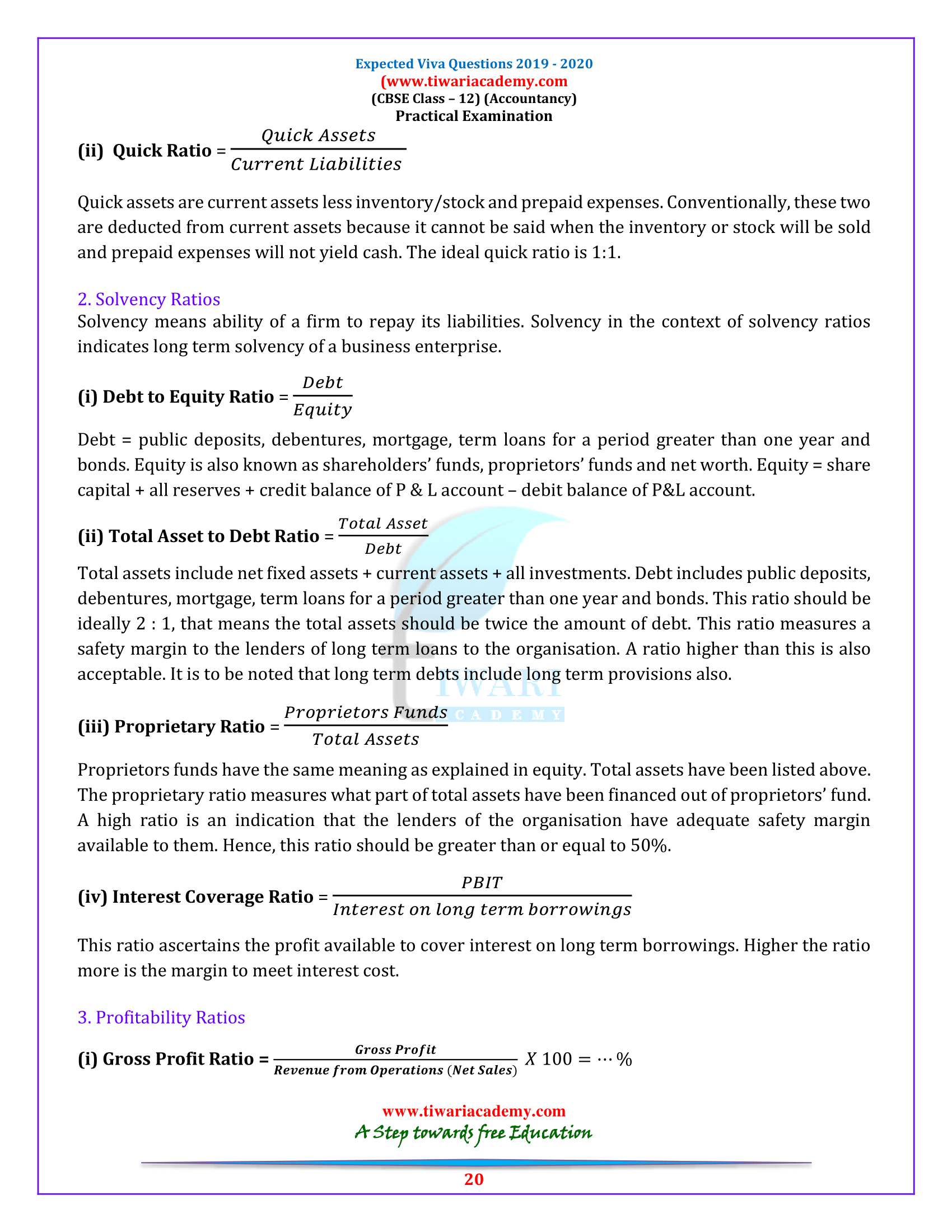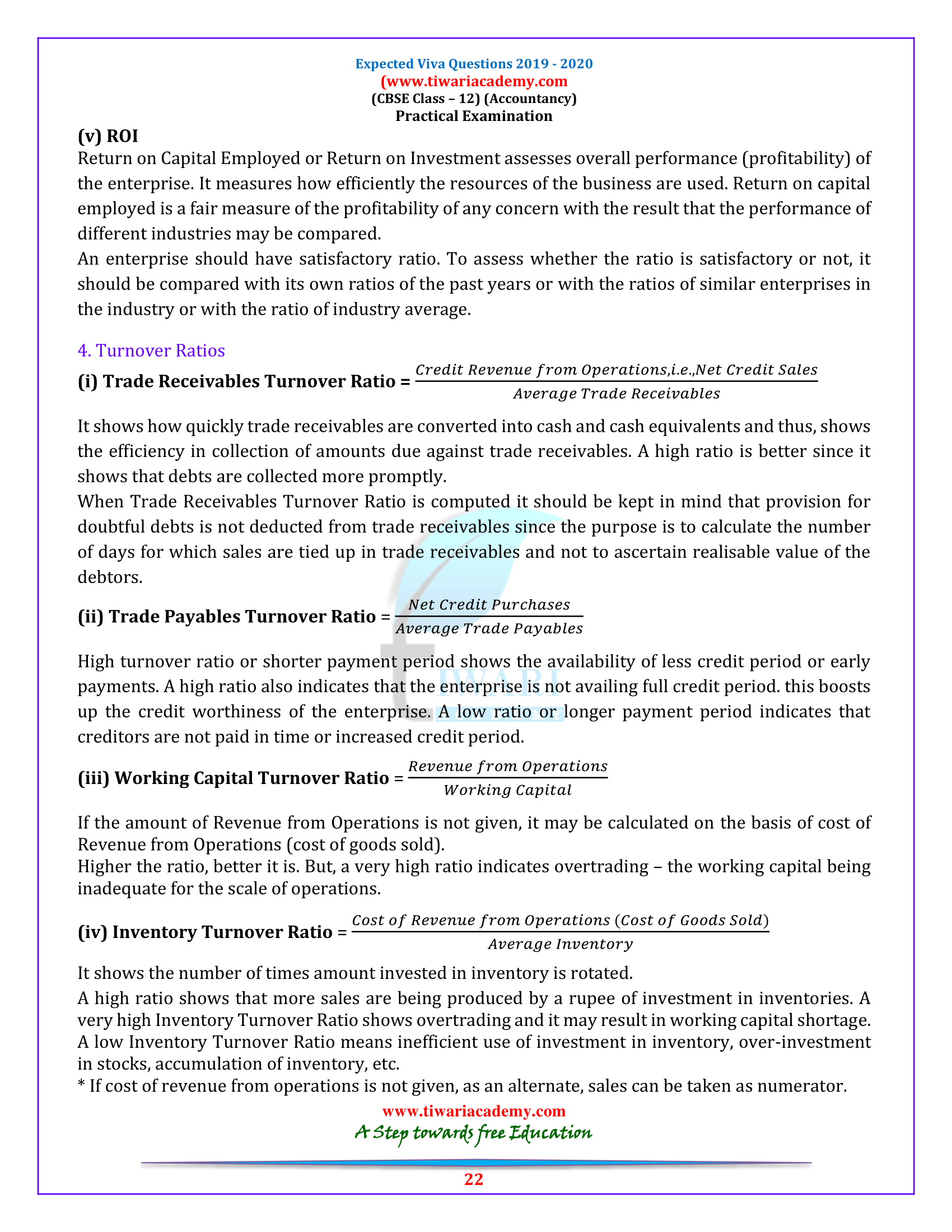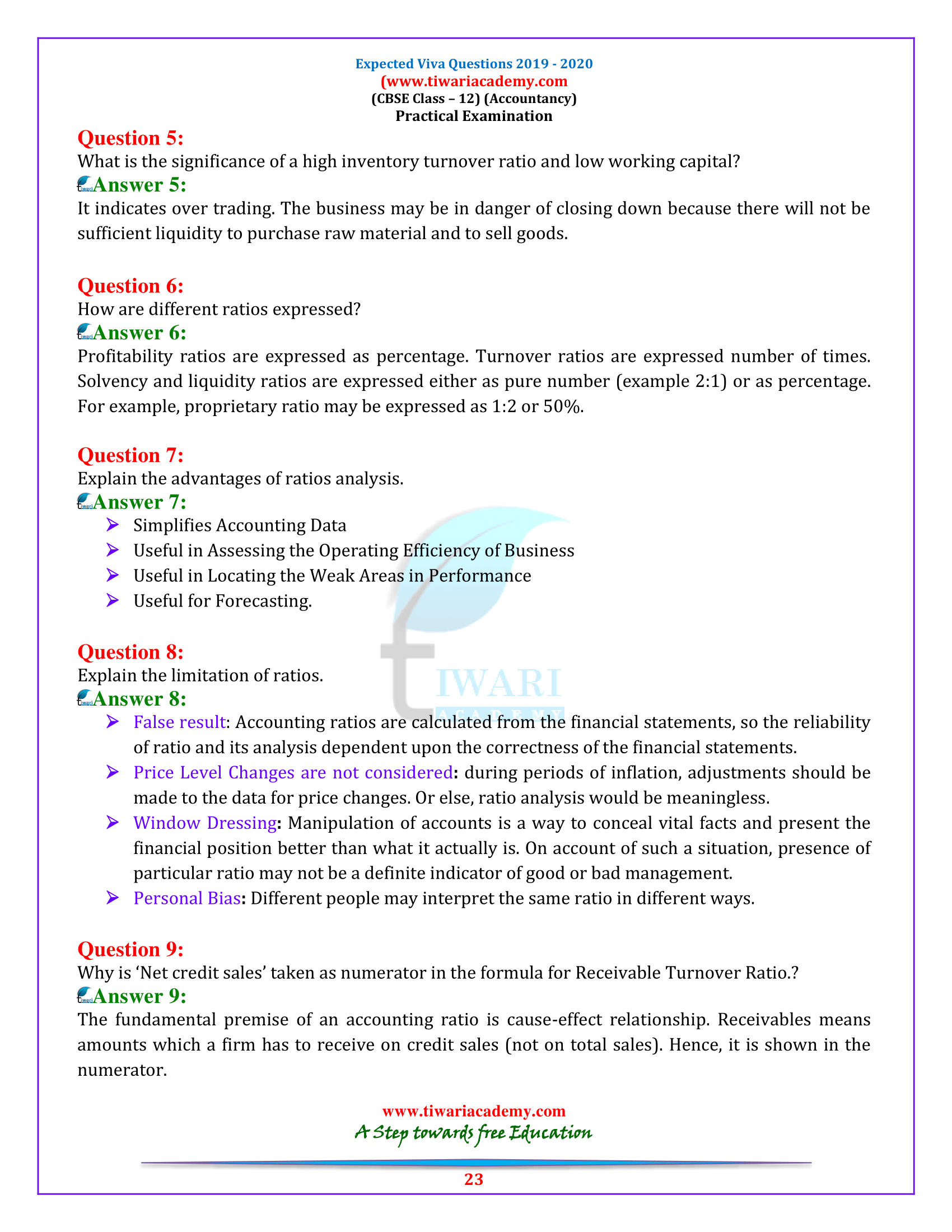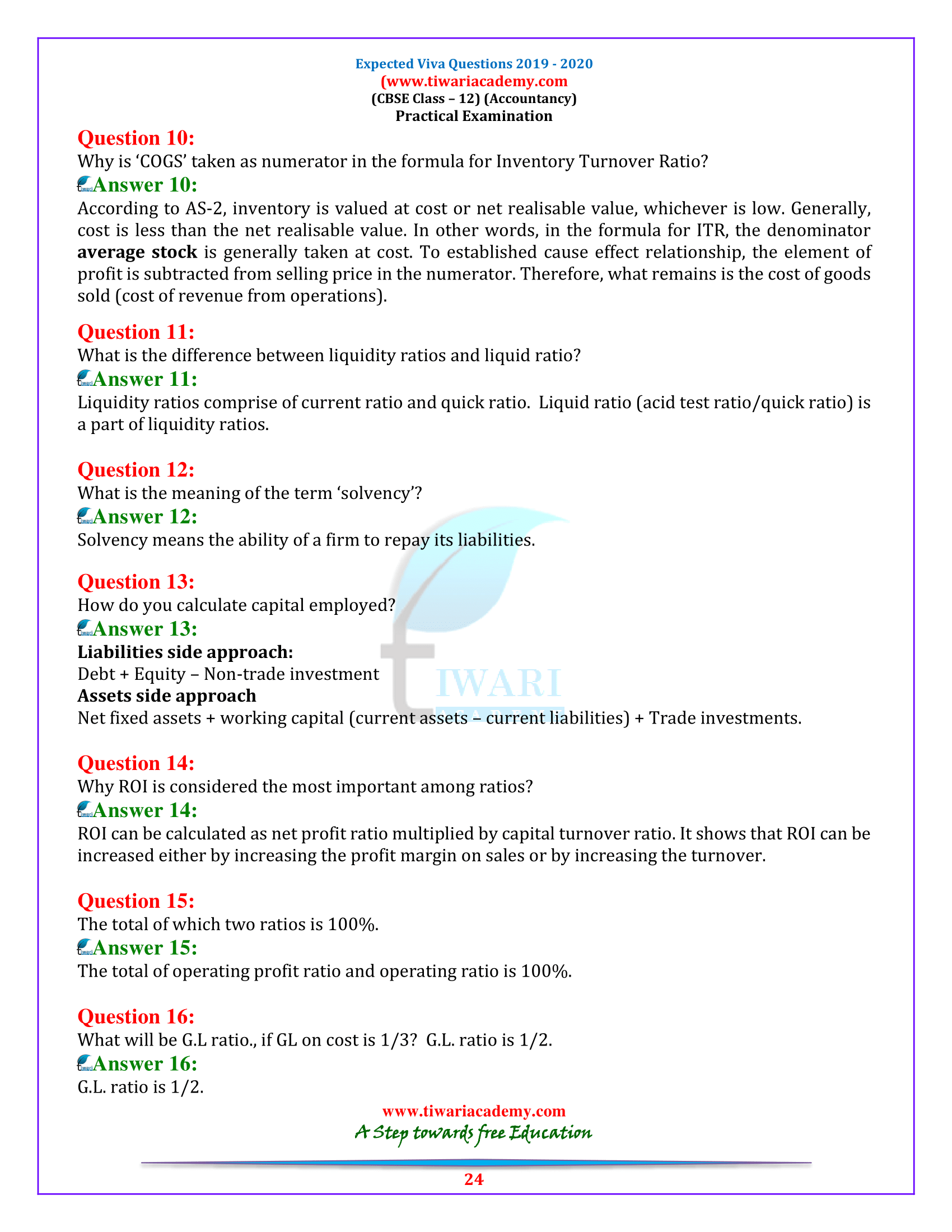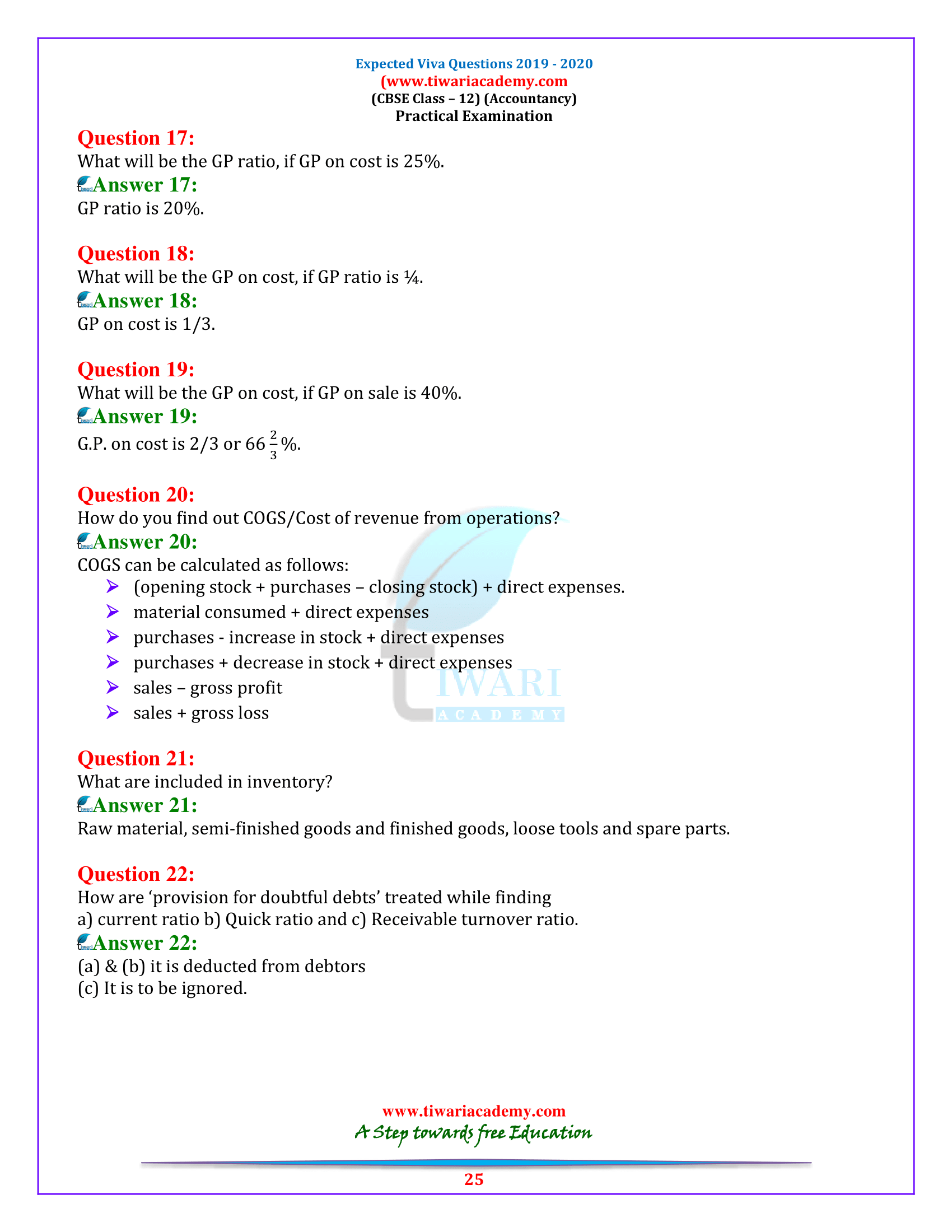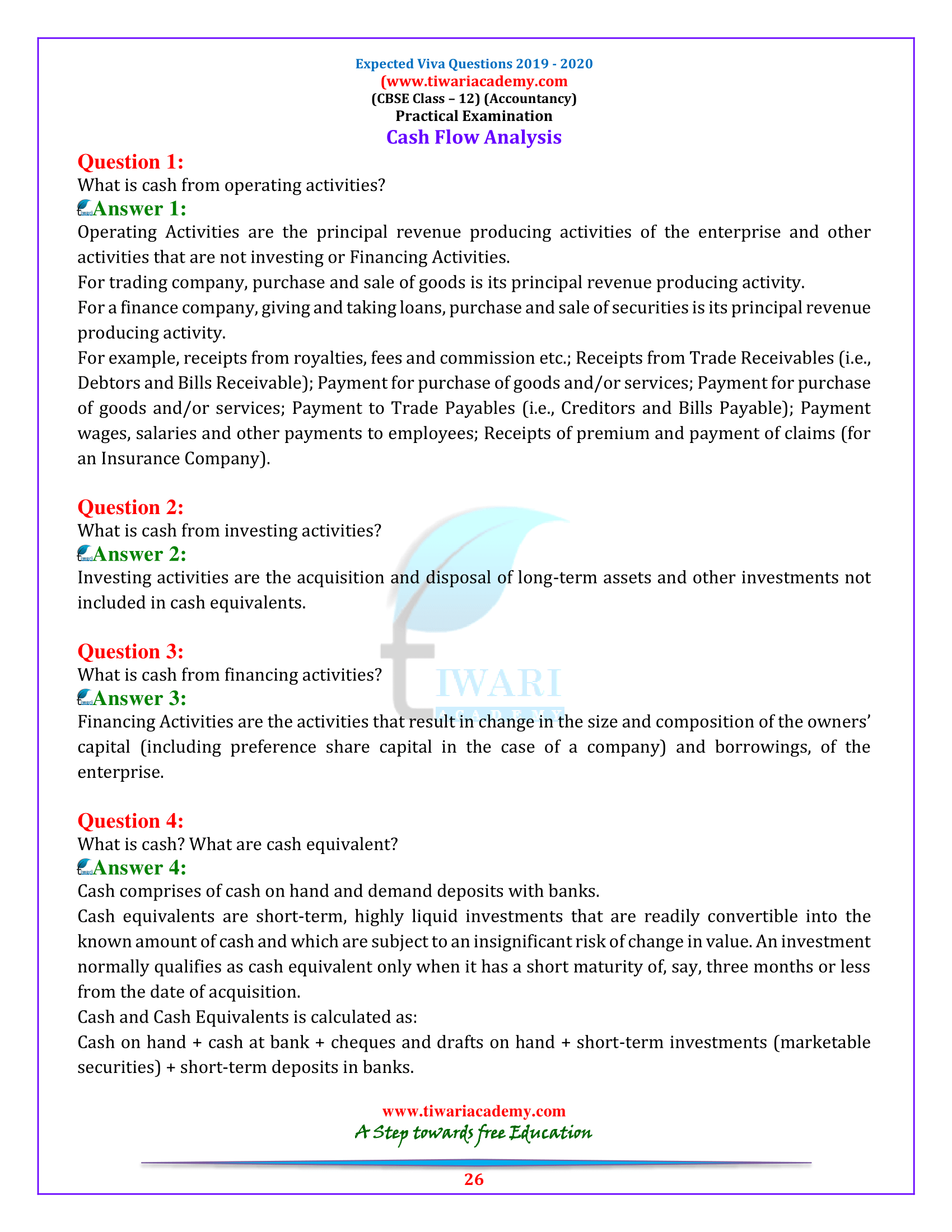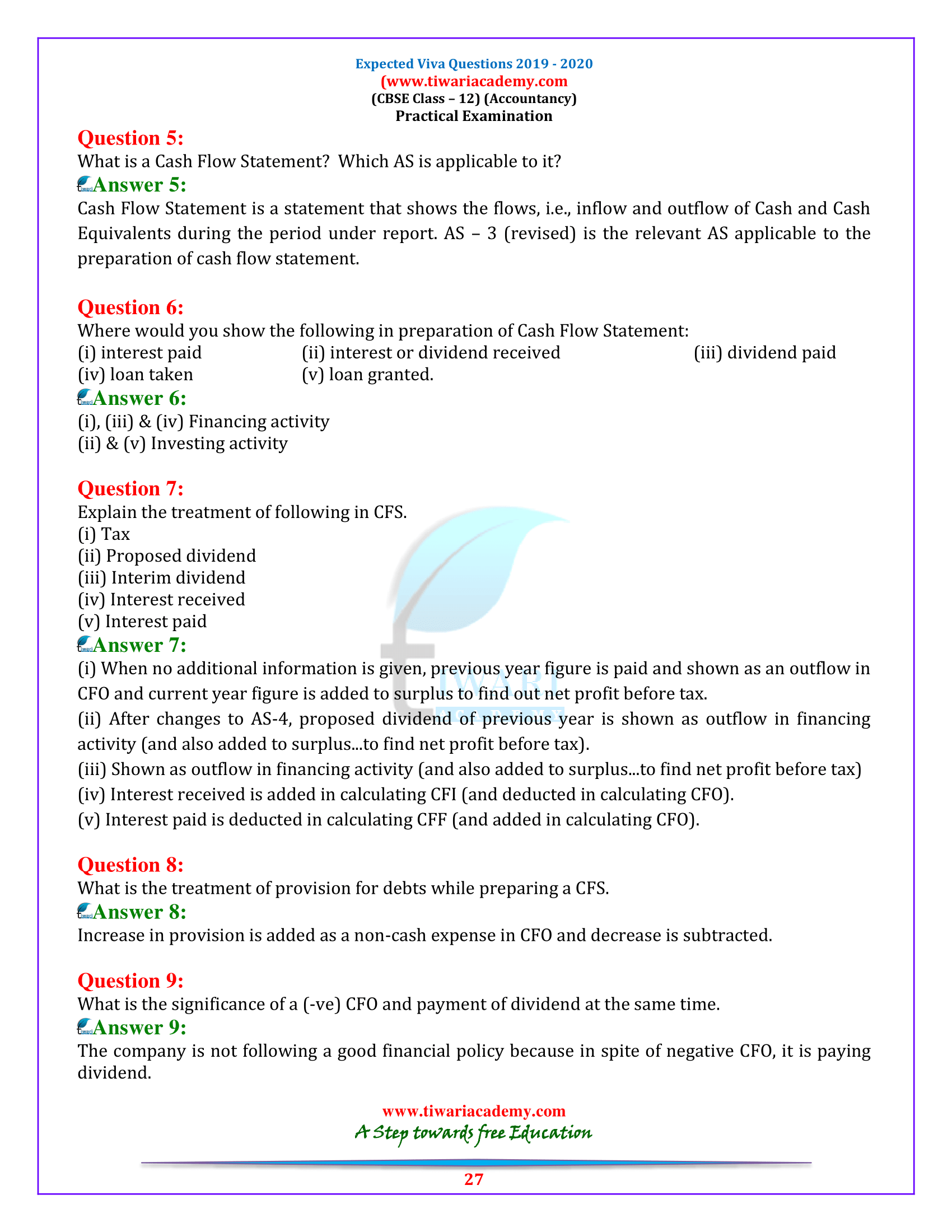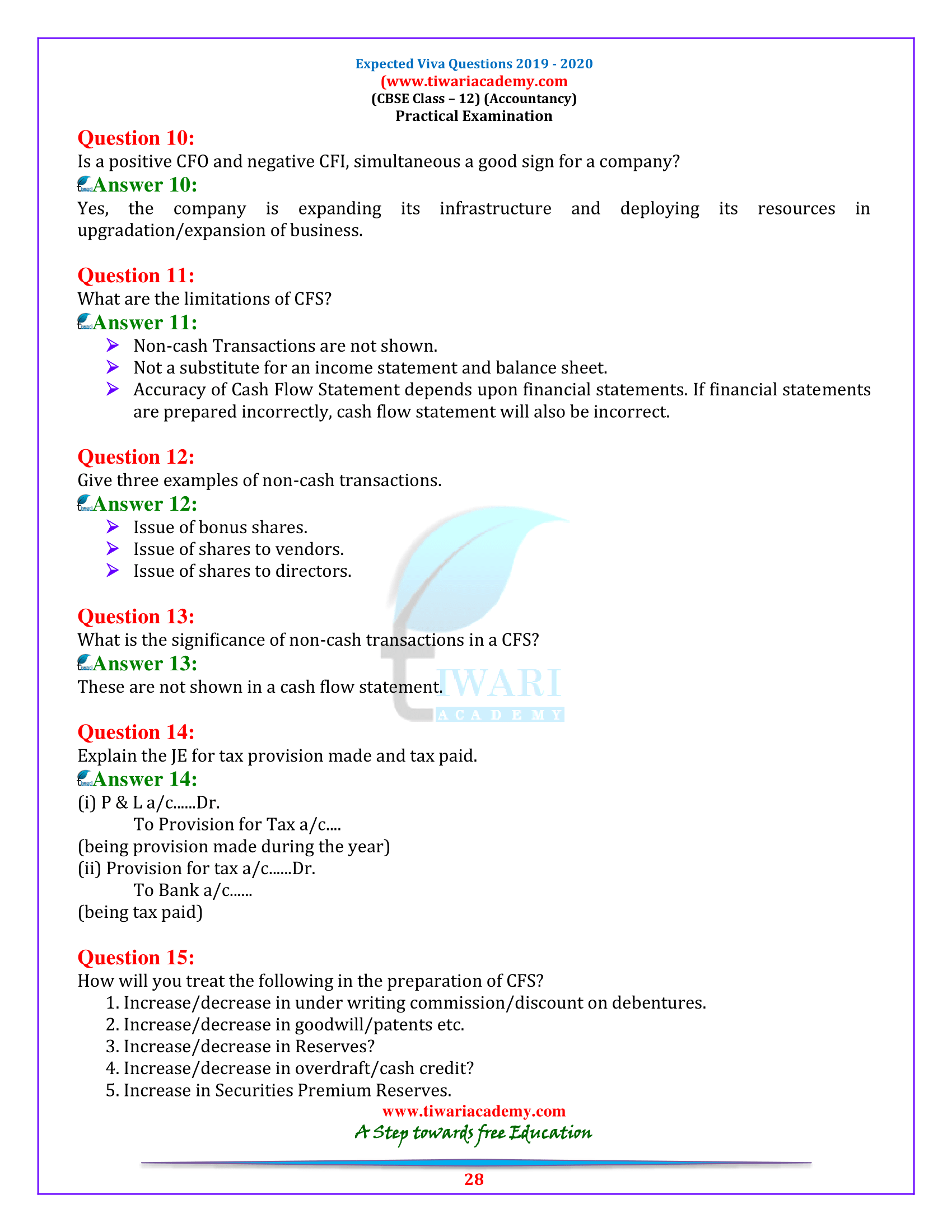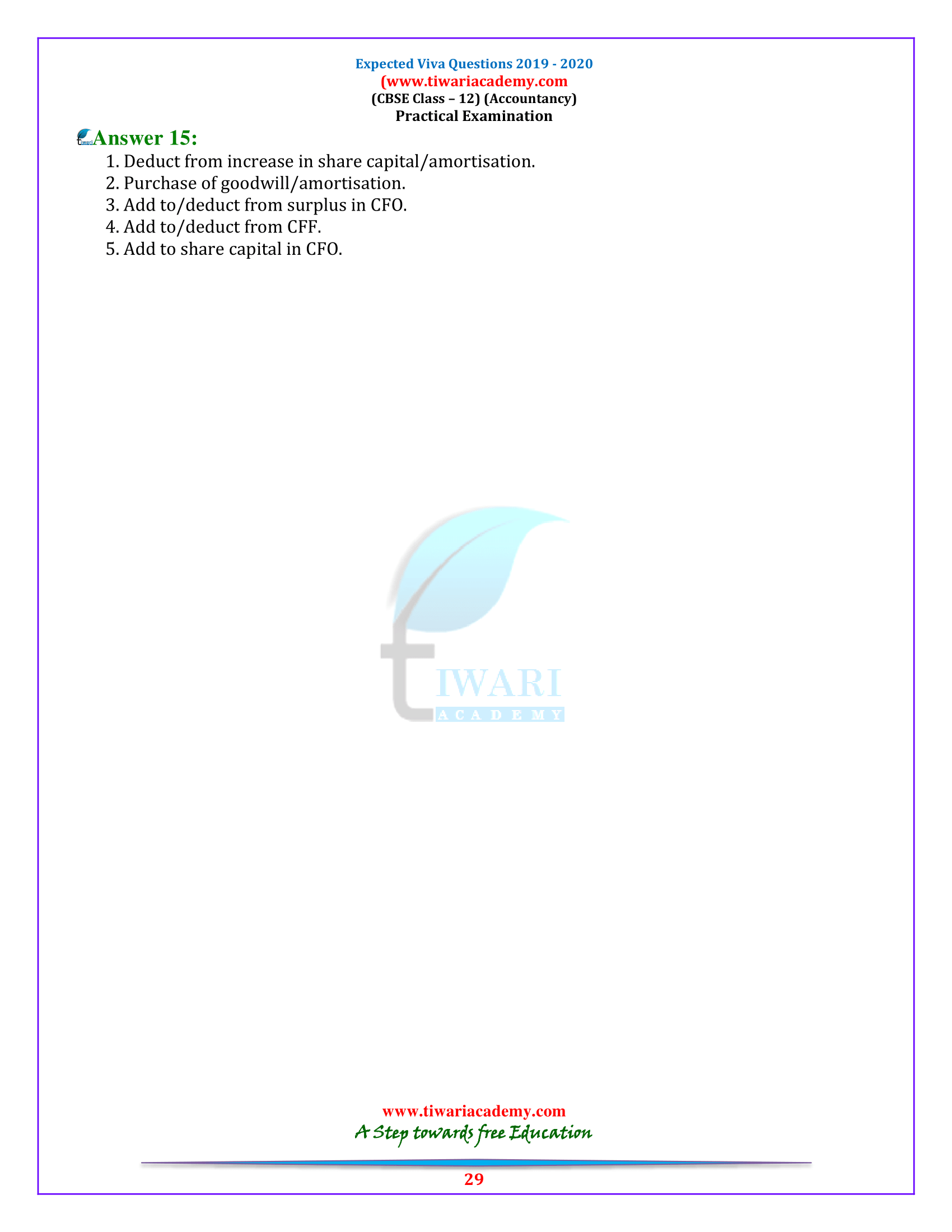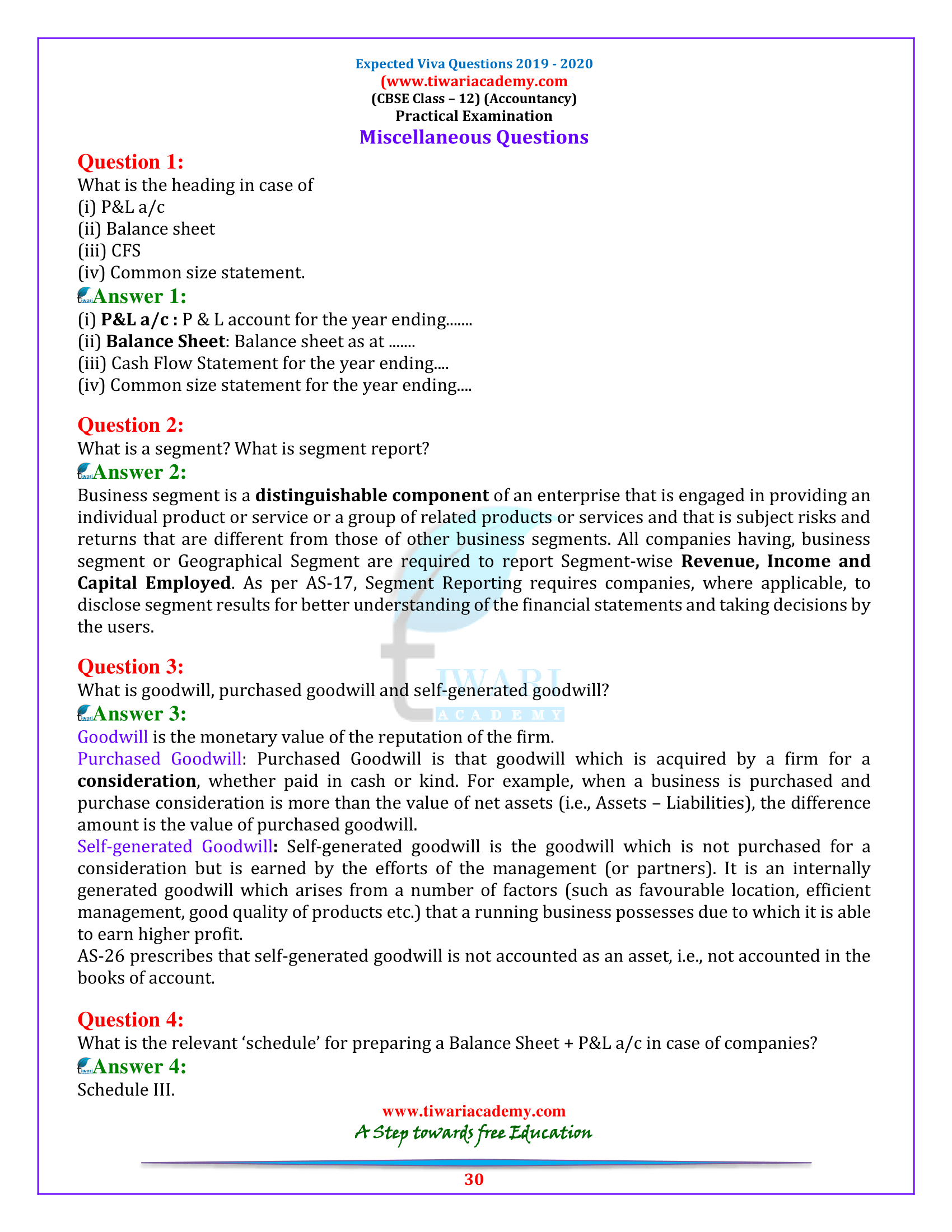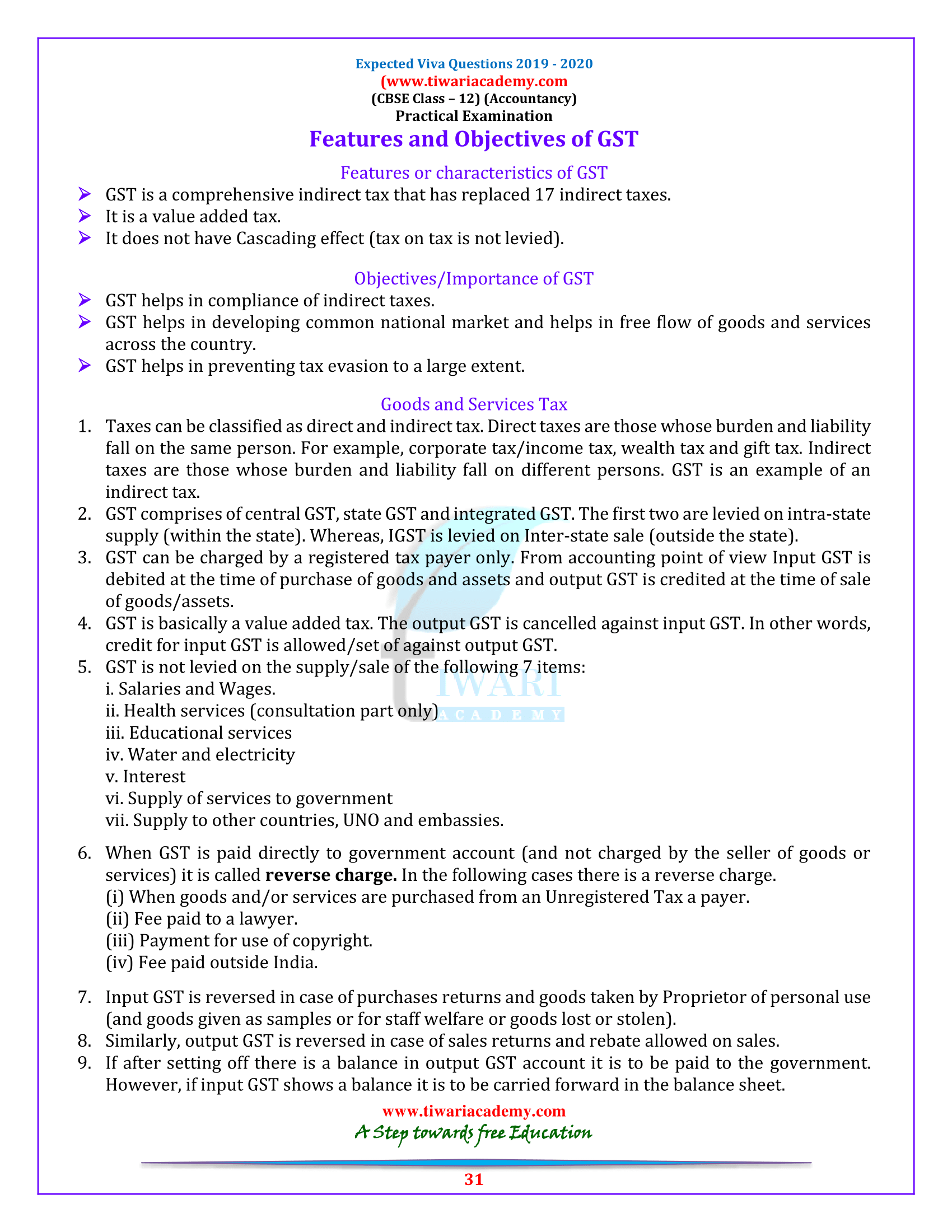Important & Viva Questions for Class 12 Accountancy CBSE 2025-26, these Frequently Asked Questions are expected questions only, it doesn’t mean that examiner will ask these questions only, This is a suggestive list of questions. Students are advised to read their practical file carefully. Questions can be asked from basics of accounting (which you have read in class – XI), basic terms, concept and conventions important journal entries, depreciation, errors and rectification, ratio analysis, cash flow analysis and the file that students prepare. Viva Questions for Class 12 Economics as well as Viva Questions for Class 12 Business Studies are also available for the preparation of CBSE 2025-26 Exams.
Conceptualised by Raju Bhatnagar.
Important & Viva Questions for Class 12 Accountancy
| Class: | 12 |
| Subject: | Accountancy |
| Contents: | Important & Viva Questions |
Important & Viva Questions for Class 12 Accounts
Important Questions for CBSE Board Exams Class 12 Accountancy as well as Viva Questions for 12th Practical Exams of Accounts are given below to free download in PDF form updated for new academic session 2025-26. Download NCERT Books and apps for offline use based on latest CBSE Syllabus. Download NCERT Solutions and Offline Apps based on various subjects. Theory Based Questions, Important Terms, Concepts and Conventions, Journal Entries, Errors and their Rectification, Depreciation, Analysis of Financial Statements, Ratio Analysis, Cash Flow Analysis and Features and Objectives of GST.
Frequently Asked Questions
CBSE NCERT Class 12 Accountancy Sure Shot Questions for Practice. These are some important as well as expected questions based on latest CBSE Syllabus 2025-26 that are generally asked in 12th class viva accountancy exam 2025-26. Frequently asked Questions for Accountancy Practical 2025-26 are given here. These Important Questions are given topic Wise and category wise. If you are thinking that What will be the viva questions for Accountancy class 12 in CBSE 2025-26, you must go through these questions.
Queries About Class 12 Accountancy
1. What are some important questions asked in 12th class viva?
2. What type of questions can be asked on the accountancy practical?
3. How should I prepare for the class 12th accounts Viva?
4. What questions are asked in accounts viva class 12 CBSE?
5. What are some important questions asked in 12th class viva?
6. How to prepare for accounts viva class 12?
7. How to prepare for class 12 accountancy practical questions?
If you have something to ask, please visit to Discussion Forum.
Important & Viva Questions on 12th Accountancy
What is book-keeping? How is it different from accounting?
Book keeping is a part of accounting. In fact, it is the basics of accounting and includes passing a journal entry, preparing a cash book and posting into ledger. Accounting is broader in nature and deals with preparation of financial statements and analysis part too.
What is double entry system of book keeping?
The double entry system is a complete and scientific system of recording business transactions. It helps in finding out profit earned in course of the business and also to find out the capital on a given date.
What is single entry system?
The single entry system is an incomplete system. Some accountants prefer to record cash transactions and the other non-cash transactions are not recorded. Hence, it is prone to errors and frauds. It suits small business only.
What are the objectives of preparing accounts?
Maintaining Accounting Records in a systematic manner. Determining Profit or Loss by preparing a profit and loss account. Determining financial position by preparing a balance sheet. Providing accounting information to users both internal and external.
What are the limitations of accounting?
Accounting is not Fully Exact: For example, some estimates are also made for ascertaining profit or loss, estimating the useful life of an asset, providing for doubtful debts, net realisable value of closing stocks etc. Accounting Ignores the Qualitative Elements: Qualitative aspects like quality or skills of management and staff, industrial relations etc. are not taken into consideration. Accounting Ignores the Effect of Price Level Changes: Accounting, however, presumes that value of money remains stable which, in fact, is not true. Accounting May Lead to Window Dressing: The term window dressing means manipulation of accounts in a way so as to conceal vital facts and present the financial statements to show a better position than what it actually is.
What are assets? What are liabilities?
Assets: Assets are the properties (tangible assets and intangible assets) owned by an entity or enterprise. Anything which will enable the firm to get economic benefit in the future, is an asset. Liabilities: Liabilities mean amount owed (payable) by the business. Liability towards the owners (proprietor or partners) of the business is termed as internal liability. On the other hand, liability towards the outsiders, i.e., other than the owners (proprietor or partners) is termed as external liability.
What is a provision? How does it differ from a liability?
A provision is a charge against profit for the purpose of providing for any liability or loss. Provision differs from liability to the extent that provision is an estimated amount while liability is determined amount (exact amount).
What are Non-Current Assets?
Assets which are not current assets are called non-current assets.
What are Current Assets?
Current assets are those assets which are: Expected to be realised in or intended for sale or consumption in the company’s normal operating cycle; or Held primarily for the purpose of trading; or Expected to be realised within 12 months from the reporting date, i.e., Balance Sheet date; or Cash and Cash equivalents unless they are restricted from being exchanged or used to settle a liability for at least 12 months after the reporting date, i.e., Balance Sheet date.
What is operating cycle?
Operating cycle is the time between the acquisition of an asset for processing and is realisation into cash and cash equivalents. Where operating cycle cannot be identified, it is assumed to be of 12 months.
What are Current Liabilities?
Current liability is that liability which is: Expected to be settled in company’s normal operating cycle; or Due to be settled within 12 months after the reporting date, i.e., Balance Sheet date; or Held primarily for the purpose of being traded; or There is no unconditional right to defer settlement for at least 12 months after the reporting date.
Give examples of Non-Current Liabilities?
Non-current liabilities are those which are not current liabilities. For example, long-term borrowings, other long-term liabilities; and long-term provisions.
What is a contingent liability? Give 3 examples.
Contingent Liability are those liabilities which may or may not arise because they are dependent on a happening in future. Contingent liability is not recorded in the books of account but is disclosed in the Notes to Accounts for the information of the users. It is to be classified into: Claims against the company not acknowledged as debts; Bills Receivable discounted from Bank not yet due for payment. Proposed Dividend (Current Year); and Other money for which the company is contingently liable.
What are commitments?
Commitments mean financial commitments due to activities agreed to by the company to be undertaken by it in future. They are to be classified into: Estimated amounts of contracts remaining to be executed on Capital Account and not provided for; Uncalled liability on shares and other investments partly paid; and Other commitments (Nature to be specified).
Why do we create a provision?
Provision is made following the Prudence Concept of accounting which holds “provide for all anticipated expenses and losses but do not provide for anticipated incomes.” By making a provision, a part of the profits and corresponding assets are retained, which otherwise could have been distributed as profits.
What is a reserve?
Reserves are the amounts set aside out of profits. It is an appropriation of profits or accumulated profits to strengthen the financial position of the business.
What is a reserve fund?
The amount of reserve when invested in outside securities is termed as reserve fund.
What is a capital reserve?
Capital Reserves are set aside out of capital profits and are normally not available for distribution as dividend. Examples of capital reserves are premium on issue of shares or debentures, profit on forfeiture of shares, profit on sale of fixed assets etc.
What is a general reserve?
General reserve is the amount set aside out of profits not for any specific purpose. It is available for any future contingency or expansion of business.
What is a specific reserve?
Specific reserve is that reserve which is set aside out of profits for a specific purpose and can be utilised only for that purpose. For example, debentures redemption reserve, workmen compensation reserve, investment fluctuation reserve.
What is a secret reserve?
Secret reserve is a reserve the existence and/or the amount of which is not disclosed in the Balance Sheet. It is also called Hidden Reserve. Such reserves are created by showing the assets at a lower amount and liabilities at a higher amount.
What is deferred revenue expenditure?
Deferred Revenue Expenditure is a revenue expenditure in nature but is written off (charged) in more than one accounting period because it is estimated that benefit of such expenditure will accrue in more than one financial year. For example, large advertising expenditure that will give benefit for more than one accounting period is a Deferred Revenue Expenditure.
What are Accounting Standards?
Accounting Standards are a set of guidelines, i.e., generally accepted Accounting Principles, issued by The Institute of Chartered Accountants of India. The objective of setting Accounting Standards is to bring uniformity in accounting practices and to ensure transparency, consistency and comparability.
What is the meaning of an account?
An account is a summary of a transaction under one head at one place.
What is meant by debit and credit?
Debit means the left side of an account and credit means the right hand side of an account.
What is opening entry?
All assets are debited and all liabilities and capital are credited at the start of a business and also at the time of starting the accounting transactions at the beginning of the year. The journal entry, so made, is called opening entry.
What are closing entries?
All nominal accounts are transferred either to trading account or to profit and loss account at the end of the year. Then gross profit is transferred from trading account to profit and loss account. Finally, net profit is transferred from P&L a/c to capital a/c. These entries are collectively known as closing entries.
What are compound entries? Give 3 examples.
When two or more journal entries are combined to form one journal entry, it is called a compound entry. For example, the journal entry for discount allowed and cash received from debtor, the journal entry for transfer of share application money to share capital and share allotment and the journal entry for forfeiture of shares.
What is other name for journal/ledger?
The journal is called the book of prime entry or original entry. The ledger is called the principal book of accounts.
What is modern classification of accounts?
According to modern classification, accounts are classified as assets, expenses, losses, liabilities, incomes and gains, capital, provisions and reserves.
How are personal accounts classified?
Natural Personal: For example, Ram’s account. Artificial Personal: For example, Bank account, Club account. Representative Personal: For example, share allotment account, prepaid expense account.
Which book contains journal folio and ledger folio?
The ledger contains journal folio. The journal and cash book contain ledger folio.
What is unique about the cash book?
The cash book is the book of prime entry/journal (because cash transactions are first entered here) as well as part of ledger (because it is in the form of an account).
What is meant by the term ‘folio’?
Folio means page number.
